Planning your PhD research: A 3-year PhD timeline example
Planning out a PhD trajectory can be overwhelming. Example PhD timelines can make the task easier and inspire. The following PhD timeline example describes the process and milestones of completing a PhD within 3 years.

Elements to include in a 3-year PhD timeline
The example scenario: completing a phd in 3 years, example: planning year 1 of a 3-year phd, example: planning year 2 of a 3-year phd, example: planning year 3 of a 3-year phd, example of a 3 year phd gantt chart timeline, final reflection.
Every successful PhD project begins with a proper plan. Even if there is a high chance that not everything will work out as planned. Having a well-established timeline will keep your work on track.
What to include in a 3-year PhD timeline depends on the unique characteristics of a PhD project, specific university requirements, agreements with the supervisor/s and the PhD student’s career ambitions.
For instance, some PhD students write a monograph while others complete a PhD based on several journal publications. Both monographs and cumulative dissertations have advantages and disadvantages , and not all universities allow both formats. The thesis type influences the PhD timeline.
Furthermore, PhD students ideally engage in several different activities throughout a PhD trajectory, which link to their career objectives. Regardless of whether they want to pursue a career within or outside of academia. PhD students should create an all-round profile to increase their future chances in the labour market. Think, for example, of activities such as organising a seminar, engaging in public outreach or showcasing leadership in a small grant application.
The most common elements included in a 3-year PhD timeline are the following:
- Data collection (fieldwork, experiments, etc.)
- Data analysis
- Writing of different chapters, or a plan for journal publication
- Conferences
- Additional activities
The whole process is described in more detail in my post on how to develop an awesome PhD timeline step-by-step .
Many (starting) PhD students look for examples of how to plan a PhD in 3 years. Therefore, let’s look at an example scenario of a fictional PhD student. Let’s call her Maria.
Maria is doing a PhD in Social Sciences at a university where it is customary to write a cumulative dissertation, meaning a PhD thesis based on journal publications. Maria’s university regulations require her to write four articles as part of her PhD. In order to graduate, one article has to be published in an international peer-reviewed journal. The other three have to be submitted.
Furthermore, Maria’s cumulative dissertation needs an introduction and conclusion chapter which frame the four individual journal articles, which form the thesis chapters.
In order to complete her PhD programme, Maria also needs to complete coursework and earn 15 credits, or ECTS in her case.
Maria likes the idea of doing a postdoc after her graduation. However, she is aware that the academic job market is tough and therefore wants to keep her options open. She could, for instance, imagine to work for a community or non-profit organisation. Therefore, she wants to place emphasis on collaborating with a community organisation during her PhD.
You may also like: Creating awesome Gantt charts for your PhD timeline
Most PhD students start their first year with a rough idea, but not a well-worked out plan and timeline. Therefore, they usually begin with working on a more elaborate research proposal in the first months of their PhD. This is also the case for our example PhD student Maria.
- Months 1-4: Maria works on a detailed research proposal, defines her research methodology and breaks down her thesis into concrete tasks.
- Month 5 : Maria follows a short intensive course in academic writing to improve her writing skills.
- Months 5-10: Maria works on her first journal paper, which is based on an extensive literature review of her research topic. At the end of Month 10, she submits the manuscript. At the same time, she follows a course connected to her research topic.
- Months 11-12: Maria does her data collection.
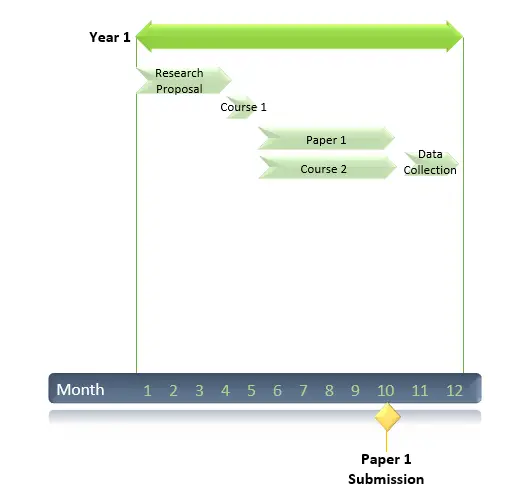
Maria completed her first round of data collection according to plan, and starts the second year of her PhD with a lot of material. In her second year, she will focus on turning this data into two journal articles.
- Months 1-2: Maria works on her data analysis.
- Months 3-7: Maria works on her second journal paper.
- Month 7: Maria attends her first conference, and presents the results of her literature-review paper.
- Month 8: Maria received ‘major revisions’ on her first manuscript submission, and implements the changes in Month 8 before resubmitting her first journal paper for publication.
- Month 9: Maria follows a course on research valorisation to learn strategies to increase the societal impact of her thesis.
- Months 9-12: Maria works on her third journal paper. She uses the same data that she collected for the previous paper, which is why she is able to complete the third manuscript a bit faster than the previous one.
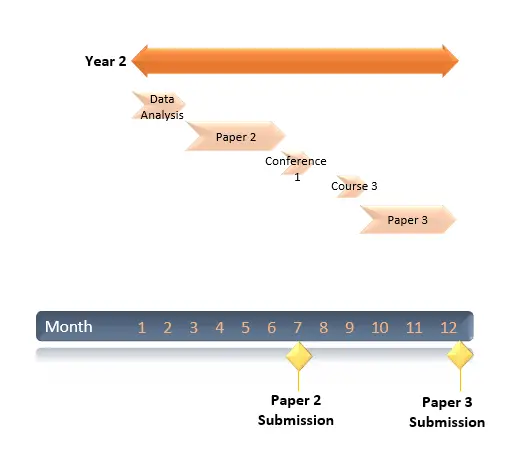
Time flies, and Maria finds herself in the last year of her PhD. There is still a lot of work to be done, but she sticks to the plan and does her best to complete her PhD.
- Month 1: Maria starts a second round of data collection, this time in collaboration with a community organisation. Together, they develop and host several focus groups with Maria’s target audience.
- Month 2: Maria starts to analyse the material of the focus group and develops the argumentation for her fourth journal paper.
- Month 3: Maria presents the results of her second journal paper at an international conference. Furthermore, she helps out her supervisor with a grant application. They apply for funding to run a small project that is thematically connected to her PhD.
- Months 4-9: Maria writes her fourth and final journal article that is required for her PhD.
- Month 10: Maria writes her thesis introduction .
- Month 11: Maria works on her thesis conclusion.
- Month 12 : Maria works on the final edits and proof-reading of her thesis before submitting it.
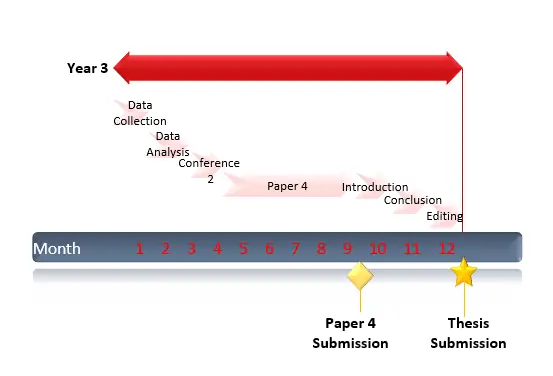
Combining the 3-year planning for our example PhD student Maria, it results in the following PhD timeline:
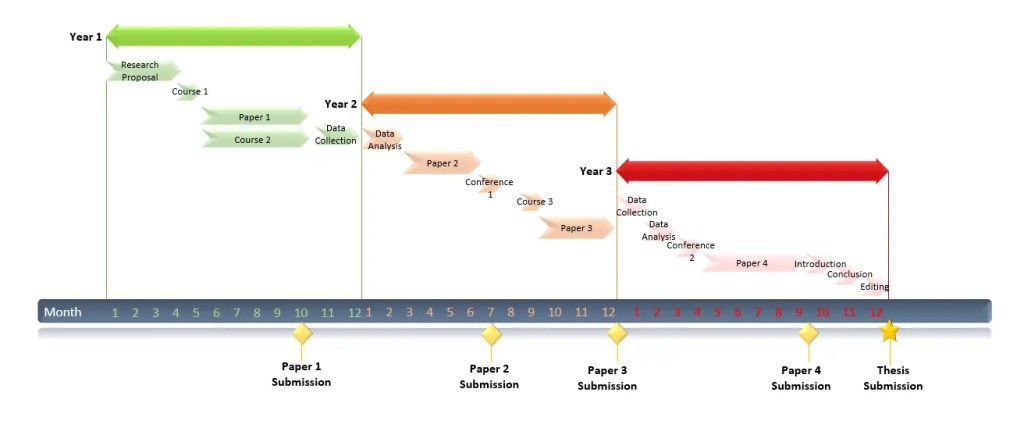
Creating these PhD timelines, also called Gantt charts, is easy. You can find instructions and templates here.
Completing a PhD in 3 years is not an easy task. The example of our fictional PhD student Maria shows how packed her timeline is, and how little time there is for things to go wrong.
In fact, in real life, many PhD students spend four years full-time to complete a PhD based on four papers, instead of three. Some extend their studies even longer.
Furthermore, plan in some time for thesis editing, which is a legitimate practice and can bring your writing to the next level. Finding a reputable thesis editor can be challenging, so make sure you make an informed choice.
Finishing a PhD in 3 years is not impossible, but it surely is not easy. So be kind to yourself if things don’t work out entirely as planned, and make use of all the help you can get.
Master Academia
Get new content delivered directly to your inbox.
Subscribe and receive Master Academia's quarterly newsletter.
10 amazing benefits of getting a PhD later in life
How to prepare your viva opening speech, related articles.

Writing a successful academic CV (and a free template)

25 short graduation quotes: Inspiration in four words or less
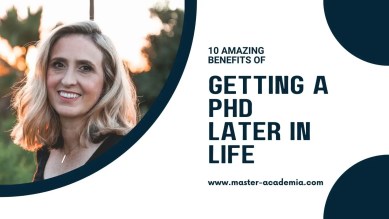
9 smart questions to ask a professor about graduate school

UCL Ear Institute
- Typical timetable for full-time PhD student (3 ...

Typical timetable for full-time PhD student (3 Year)
Students and studentships.
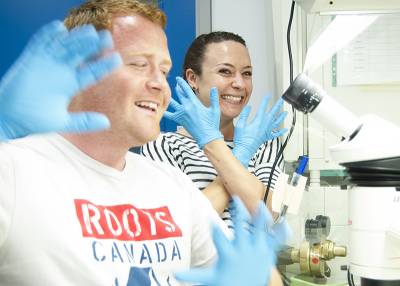
Find out what our current cohort of research students are getting up to, where our past students have ended up and whether we have any Studentships currently advertised on our jobs page:
- Current students
- Alumni testimonials
- Studentships (Jobs page)
- Resources for students/supervisors

A PhD timeline for finishing quickly [Free Gantt Download]
Navigating the labyrinthine journey of a PhD program is no small feat.
From the day you step into your graduate program as a bright-eyed doctoral student, you’re immediately thrust into a complex weave of coursework, research, and milestones.
By the second year, you’ve transitioned from coursework to research, laying the groundwork for your dissertation—a pivotal component in your scholarly endeavour.
Come the third year, you face the critical oral examination, a hurdle that could make or break years of hard work.
But how does one streamline this multifaceted journey? The answer lies in a well-planned PhD timeline.
This blog serves as an invaluable guide for any PhD student looking to complete their doctoral studies efficiently, walking you through each milestone from coursework to graduation.
How to Begin with the PhD Timeline Planning?
Planning your PhD timeline is an essential first step in your PhD program.
Success in any PhD program depends, to a large extent, on effective time management and keeping track of progress through a thoughtfully crafted PhD timeline.
Start with outlining all your major requirements:
- coursework,
- dissertation,
- and the expected time needed for each task.
I also highly recommend factoring in failure time – give yourself a little bit of wiggle room for when things, invariably – go wrong.
It’s crucial to remain realistic about the time you can commit daily or weekly while keeping long-term goals in mind.
Regular check-ins on your PhD timeline and supervisor will help you stay on track and allow you to adapt if necessary.
Adjustments may be needed as you progress through your PhD program, but having a timeline as a guide can make the journey less daunting and more achievable.
Elements to include in a 3-year PhD timeline
The initial stage in this timeline typically involves coursework, often lasting one year, where the student engrosses themselves in advanced study in their chosen field.
Once the coursework is done (USA PhDs), they focus on proposing, conducting, and presenting their initial research.
By the end of the second year, most students should have a clear direction for their dissertation, a core component of the PhD process.
In this third and final year of the PhD timeline, the student focuses primarily on completing their dissertation, which involves collecting data, analyzing results, and organizing their research into a substantial, original, and cohesive document that contributes to contemporary knowledge in their field.
Regular reviews and modifications of the PhD timeline may also be necessary to accommodate various unpredictable circumstances, thus making this timeline both a guide and a flexible workplan.
It is a significant tool in successfully navigating the maze of becoming a PhD holder.
Create Your PhD Timeline for a 3 year completion
Creating a timeline for a 3-year PhD program requires careful planning, as you’ll have multiple milestones and tasks to complete.
This timeline may vary depending on your specific field, institution, or country, but here is a general outline you can use as a starting point:
Free Gantt chart excel template
Here is a free template you can modify for your own research:
Example Gantt chart for a USA PhD
Here are some common steps involved in completing a PhD, which I’ll use to create the Gantt chart:

- Orientation and Coursework (Semester 1) : Familiarization with the university, department, and coursework.
- Coursework (Semester 2) : Continued coursework and possible teaching/research assistantships.
- Select Advisor and Research Topic : Usually done towards the end of the first year or the beginning of the second year.
- Preliminary Research : Initial research and literature review.
- Complete Coursework (Semester 3) : Wrap up any remaining required courses.
- Research Proposal : Develop a full research proposal including methodology.
- Qualifying Exams : Exams to transition from a Ph.D. student to a Ph.D. candidate.
- Begin Research : Start of actual research based on the approved proposal.
- Conduct Research : Data collection, experiments, and analysis.
- Intermediate Review : A review to assess the progress of the research.
- Write Papers : Start writing papers and possibly publishing in journals.
- Finalize Research : Final experiments and data analysis.
- Write Dissertation : Writing the actual Ph.D. dissertation.
- Dissertation Defense : Defending the dissertation before the committee.
- Graduation : Completing all requirements and graduating.
Example Gantt chart for a UK, European and Australian PhD
For Ph.D. programs outside the United States, especially in Europe and some other parts of the world, students often go straight into research without the need for coursework. Here are some common steps for such programs:

- Orientation : Familiarization with the university and department.
- Select Advisor and Research Topic : Usually done at the beginning of the program.
Wrapping up
The journey to earning a PhD is complex and demanding, filled with academic milestones from coursework to research to dissertation writing.
The key to a smooth and efficient doctoral journey lies in well-planned time management—a structured PhD timeline.
This blog serves as an invaluable guide, offering detailed tips for planning out each academic year in both U.S. and international PhD programs. It emphasizes the importance of starting with an outline of major requirements and factoring in “failure time” for unforeseen challenges.
For those looking to navigate their PhD journey in three years or beyond, having a flexible but comprehensive timeline can be the compass that guides them successfully through the academic labyrinth.
Whether you’re just starting out or already deep into your research, the principles and strategies outlined here can help streamline your path to that coveted doctoral hood.

Dr Andrew Stapleton has a Masters and PhD in Chemistry from the UK and Australia. He has many years of research experience and has worked as a Postdoctoral Fellow and Associate at a number of Universities. Although having secured funding for his own research, he left academia to help others with his YouTube channel all about the inner workings of academia and how to make it work for you.
Thank you for visiting Academia Insider.
We are here to help you navigate Academia as painlessly as possible. We are supported by our readers and by visiting you are helping us earn a small amount through ads and affiliate revenue - Thank you!

2024 © Academia Insider


How to Prepare a PhD Research Plan/Schedule?
PhD research plan is a structured schedule for completing different objectives and milestones during a given timeframe. Scholars are usually unaware of it. Let us find out how to prepare it.
Between March 2021 to 2022, I read almost 15 different research proposals from students (for their projects) and only a single one, I found, with a comprehensive research plan for 3 years. Which is still not, kind of practical, probably copied from other students.
Such entities are not known to over 90% of students, if some know that because their university asked for but unfortunately, this basic procedure lacks penetration among students. I don’t know the exact reason, but students lack a basic understanding of the research process.
Meaning, that they don’t know or perhaps don’t complete their course work needly. PhD research requires many documents, SOPs and write-ups, before even starting it. For example, a rough research plan, research proposal, initial interview, competence screening, grant proposal and so on.
However, the requirement varies among universities and thus knowledge regarding basic procedures often also varies among students. So I’m not blaming students but certainly, it is the fault of the university side, as well.
When you come up with a research proposal with a research schedule or entire plant, certainly it will create a positive image and good reputation. So it is important. But how to prepare it?
Hey, there I’m Dr Tushar, a PhD tutor and coach. In this article, we will understand how we can prepare a structured plan for the PhD research and how to execute it.
So let’s get started.
How to prepare a PhD research plan/schedule?
A PhD research plan or schedule can be prepared using the GANTT chart which includes a month, semester or year-wise planning of the entire PhD research work.
First, enlist goals and objectives.
It’s not about your research objective enlisted in your proposal. I’m talking about the objectives of your PhD. Take a look at some of the objectives.
Note that these are all the objectives that should be completed during the PhD, but not limited to a specific subject. Note you have to show how you can complete or achieve each objective during the entire tenure of your work.
And that is what the plan/schedule is all about. Next, explain the time duration. The time required to complete each goal, roughly. For example, a semester or a year to complete the course work or 4 to 8 months for completion of ethical approval.
Now two things must be known to you, at this point in time.
- First, enlist the time required to complete each objective, as aforementioned.
- Second, what goals would you complete during each semester?
For instance, course work takes a semester to complete, but during the period a scholar can also craft their PhD research title, research proposal, ethical approval and grant proposals.
Now it is also crucial to know that there is no time bound to complete goals, but it should be completed as you explained. Let’s say you can plant it for 3 years, 4 or even 5 years depending on the weightage of your work.
In summary, the answer to the question of how to prepare a research plan is,
- Enlist your goals or objectives.
- Decide the time required to complete each goal.
- Prepare a GANTT chart.
Now you have prepared zero-date planning for your research but how to present it? The answer is a GANTT chart.
GANTT chart for PhD research plan:
GANTT chart is a task manager and graphical presentation of how and how many tasks are completed or should be completed against a given time duration. Take a look at the image below.
How can you prepare one?
Open MS Excel (on Windows) or numbers (on Mac).
Enlist goals or objectives in a column.
Enlist years (duration of PhD) in a row and bifurcate them into individual semesters. You can also prepare a month-wise plan, that’s totally up to you. In my opinion, semester-wise planning is good because research is a lengthy and time-consuming process. So monthly planning would not work.
To make a chart more attractive and readable use colors, as I used. Now mark a ‘cell’ against a column and row showing the objective which you are going to complete in a semester. Take a look.
After the end of this, your GANTT chart would look like this.
You can prepare a month-wise planning, individual semester-wise planning and goal-wise planning etc. I will explain these things in upcoming articles on 5 different types of GANTT charts for PhD.
Custom writing services:
If you find difficulties in preparing a research plan, synopsis, proposal or GANTT chart. We can work on behalf of you. Our costume services are,
- Synopsis writing
- Project writing
- Research proposal writing
- Research planning and GANTT chart preparation.
You can contact us at [email protected] or [email protected] to get more information.
Wrapping up:
Planning and executing a research schedule are two different things. Oftentimes, students just prepare as per the requirements and then do work as per their convenience. Then they are stuck in one place and just work around the time.
Plan things. Make your own GANTT chart, put it on your work table or stick it on a wall so that you can see it daily. Try to achieve each goal in time. Trust me things will work and you will complete your PhD before anyone else.

Dr. Tushar Chauhan is a Scientist, Blogger and Scientific-writer. He has completed PhD in Genetics. Dr. Chauhan is a PhD coach and tutor.
Share this:

- Share on Facebook
- Share on Twitter
- Share on Pinterest
- Share on Linkedin
- Share via Email
About The Author

Dr Tushar Chauhan
Related posts.

Why is it called a Doctor of Philosophy?

Preparing for a PhD Viva
Leave a comment cancel reply.
Your email address will not be published. Required fields are marked *
Save my name, email, and website in this browser for the next time I comment.
Notify me of follow-up comments by email.
Notify me of new posts by email.
- Prospective Students
- Make a gift to the School of Education
- Attend a credential program info session
- Know if my courses meet the prerequisite requirements for the teaching credential
- Find course schedules
- Learn more about the MA part of the Credential/MA program
- Learn about applying to the teaching credential program
- Know if the School offers a part-time, night or summer teaching credential program
- Learn about the cost of the Credential/MA program
- Learn about the Doctorate in Educational Leadership (EdD)
- Learn about the PhD program

- Course Requirements
PhD Timeline and Milestones
- PhD Advising
- GGE Research Seminars
- Financial Support
- Language, Literacy & Culture
- Learning & Mind Sciences
- Mathematics Education
- School Organization & Educational Policy
- Science & Agricultural Education
- Graduate Group Faculty
There is no specific length of time associated with earning a PhD. Across disciplines and campuses, the average amount of time to earn the degree is between four and five years, although individual time varies widely.
The education program was planned to span at least three years and was designed for students who already have undertaken graduate work and already demonstrated competence and interest in educational research. The length of the program, however, is based on the student’s progress in mastering subject matter, preparing for examinations, preparing research proposals, and conducting original research. The nature of these activities differs and makes for considerable time variability among students in the same program.
Year-by-Year Guideline
A general guideline for planning your graduate program is described below.
During the first year, students normally complete any prerequisites that are deemed necessary by the admissions committee, the graduate advisor, or faculty advisor. General program prerequisites are noted on the Advising Form in this handbook.
In addition to prerequisites, in the fall all PhD students are required to complete the one-quarter, 4-unit Proseminar In Education (EDU 291).
All students will take the following methodology core courses:
- EDU 201 Qualitative Methods (4) Winter
- EDU 204A Quantitative Methods in Educational Research: Analysis of Correlation and Design (4) Spring
Second year
During the second year of the program, students complete any remaining background course work or required course work. The rest of the second year is devoted to completing courses in your area of specialization. At least 32 units (approximately eight courses) are required for the area of specialization; these are selected with the assistance of the faculty advisor. You should also complete at least two advanced methodology courses. Students will also complete the Preliminary Examination by the end of the second year.
Second/Third year
During the second and third year, students prepare for and complete the qualifying examination. The student and his or her qualifying examination committee will design a qualifying examination to assess readiness to complete the dissertation.
Fourth year plus
PhD dissertations must satisfy the standards and format of the Graduate Studies Office and those of an appropriate publications manual, for example, that of the American Psychological Association (latest edition). In general, the style and format of the journals by the AERA should be used in written work in this program.
The Office of Graduate Studies will assign a three-person committee to guide the dissertation, with one member serving as chair. Normally a student’s dissertation advisor will be the chair. All three members of the committee must approve the dissertation.
When the committee approves the dissertation, the student makes a public presentation of the dissertation results. The details of place and time for dissertation presentations will be publicly posted, and any member of the University community may attend and raise questions at this exit seminar. This presentation is not an examination, but an opportunity for students to inform members of the graduate group and others about their research. Participation in the process of research dissemination is viewed as a scholarly activity.
Expected Timeline for Completing Program Milestones
Students entering the Ph.D. program in Education are expected to make timely progress toward completing their doctoral studies. We have defined timely progress in terms of several program milestones. The table below specifies the time that students should take to complete each milestone. Students are encouraged to complete program milestones sooner than indicated, but not at the expense of producing quality work.
Students who do not complete program milestones within a normal time period are considered by the GGE faculty to be at risk of not completing the program successfully and will be counseled by their advisor to help them get back on track as quickly as possible.
Program Milestone Years to Completion
MILESTONE #1: Course requirements completed, Preliminary Exam passed, & Qualifying Exam committee formed two to three years from beginning of program
MILESTONE #2: Completion of both of the following two separate steps:
- Qualifying exam completed
- Dissertation proposal approved (Advancement to Candidacy) One year past Milestone #1, not to exceed four years from beginning of program
MILESTONE #3: Dissertation completed within four years past Milestone #2, not to exceed a total of seven years in the program.
We expect students to complete each milestone within the specified period of time. We recognize, however, that students come into the program with varied backgrounds and interest, and these will be reflected in somewhat different timelines through and between program milestones. We also recognize that exceptional circumstances can make it difficult for students to complete a program milestone within the normal period of time.
Progress in completing program milestones is an important criterion in shaping faculty evaluations of student work, including evaluations for fellowship and travel support, teaching assistantships, and research assistantships. GGE faculty also look for indications of each student’s course completion record, writing and reading ability, and writing and research productivity.
Faculty members also view the PhD program as a point of entry for students into the educational research community. Evidence that students are taking some initiative in joining this community - through collegial engagement with faculty, other doctoral students, and educational researchers in other venues (conferences, associations, journals, etc.) – is regarded very favorably by faculty members, not only on its own merits but as a resource to students in developing professional skills and dispositions. Evidence that students are not engaged in collegial relations of this sort is viewed by faculty members as a liability for students who hope to complete the program successfully and in a timely manner.
- Request new password
- Support portal

- Youth Program
- Wharton Online
How the PhD Program Works
Program Overview
Completing your doctorate at Wharton requires 5 years of full-time study. The first 2 years in the program prepare you for admission to candidacy by taking courses, qualifying exams, and starting research projects. In the last few years, you are primarily conducting research full-time including writing and defending your doctoral dissertation.
Admission to candidacy.
You begin by taking courses required for your program of study. All programs requires a preliminary exam, which may be either oral or written.
Some programs may have further requirements, such as an additional exam or research paper. If you enter with a master’s degree or other transfer credit, you may satisfy the formal course requirements more quickly.
Beginning the Wharton PhD Curriculum How the first two years of the Wharton program helped students discover their interests, learn the tools of the profession, and fuel their passion for teaching.
The Doctoral Dissertation
Upon successful completion of coursework and passing a preliminary examination, you are admitted to candidacy for the dissertation phase of your studies.
Your doctoral dissertation should contain original research that meets standards for published scholarship in your field. You are expected to be an expert in the topic you choose to research.
You are admitted to candidacy for the dissertation phase of your studies upon successful completion of coursework and passing a preliminary examination, but you can start thinking about and working on research of relevance at any time.
The dissertation process culminates with a “defense,” in which you defend the proposal orally before your dissertation committee.
While working on your dissertation, you interact extensively with Wharton faculty. Together with interested faculty, you create your own research community that includes your dissertation advisor and dissertation committee.
Policies and Procedures
Get more detailed explanation of course requirements, academic standards, the Teacher Development Program, time limits, and dissertation procedures and requirements.
Sample Program Sequence
Years 1 & 2.
Coursework Examination Research Papers Research Activities Field-Specific Requirements
Directed Reading & Research Admission to Candidacy Formulation of Research Topic
Years 4 & 5
Continued Research Oral Examination Dissertation
Hear From Our Doctoral Community
Why i chose academic research instead of consulting.
Andrea Contigiani
Closing the Tenure Gap for Business Faculty of Color
The Wharton School
Wharton’s PhD Program Prepared This Doctor to Perform Economic Evaluations in Health Care
PhD Completion Process
Congratulations!
As a PhD student, you have spent spend significant time at the University of Rochester taking courses, completing research in your field, completing milestones and are now ready to complete your degree.
The final requirement in earning a PhD degree is the completion and defense of the doctoral dissertation. Understanding the steps and associated deadlines in the dissertation submission and degree conferral process is necessary to establish a successful plan. For complete descriptions of the process, please review the Regulations and University Policies Concerning Graduate Students .
The page below is organized by before, during and post-oral defense. Please read the page in it’s entirety and email questions you have to [email protected]
Doctoral Qualifying Exam / Admission to Candidacy
All PhD programs must administer a qualifying examination as part of the PhD program requirements. The qualifying examination may be either written or oral or both, at the discretion of the department/program, and must be passed at least six months before the final examination may be taken.
The associate dean of a school certifies that a student has passed the qualifying examinations and is recommended for candidacy.
For more details, please review page 12 of the Regulations and University Policies Concerning Graduate Students .
Planning for the Final Oral Exam / Dissertation Defense
At least six months before you plan to defend your dissertation, you should contact the graduate coordinator of your program for details regarding the submitting the defense. During the months leading up to the anticipated defense, your graduate coordinator will walk you through the process and explain any department specific nuances.
Pay careful attention to the five PhD degree cycle deadlines. In each degree cycle, there is a deadline for the last day to complete your degree requirements. There are no exceptions to the deadlines. If a deadline is missed, your name cannot be approved by the Council on Graduate Education and presented to the Board of Trustees until the following degree date.
The oral exam/defense/dissertation is approved at multiple levels of the University. Starting with the program, oral exam/defense/dissertation committee, school graduate deans and the University Dean of Graduate Education. You will receive emails a few days before your defense confirming that the approvals for the defense have all been received.
PhD academic calendar
PhD students can reference their specific academic calendar in the drop-downs below.
To enable review by the Graduate Education Offices in the Schools and University Graduate Education, online dissertation committee and program director approvals must be completed the following number of working days before the defense:
- SMD and SON: At least 10 working days before the defense
- AS&E, Warner and Simon: At least 15 working days before the defense
- ESM: At least 20 working days before the defense
A minimum of five working days must elapse between the approval of the candidate’s School Dean to advance the record to University Graduate Education and the day of the defense. This time has been included in the schools’ lead times listed above.
Defenses may be held during regular business hours on any University working day with the exceptions listed below. See calendar below for additional non-working days.
Monday, May 27: The University is closed in observance of Memorial Day. This day cannot be counted as a working day.
Wednesday, June 19: The University is closed in observance of Juneteenth. This day cannot be counted as a working day.
Thursday, July 4: The University is closed in observance of Independence Day. This day cannot be counted as a working day.
Friday, August 23, 4 p.m.: Last day to submit final corrected dissertation to the ProQuest website to fulfill degree requirements for an August 2024 degree conferral.
Monday, August 26: Fall semester begins.
Saturday, August 31: August 2024 PhD date.
Wednesday, August 28, 4 p.m.: Last day for students who have completed defenses to submit final corrected dissertation for October 2024 degree to the ProQuest website without having to register for Fall 2024. AFTER THIS DATE, SUBMISSION OF DOCUMENTS FOR DEGREE COMPLETION REQUIRES REGISTRATION FOR THE FALL SEMESTER.
Monday, September 2: The University is closed in observance of Labor Day. This day cannot be counted as a working day
Thursday, September 26, 4 p.m.: Last day to submit final corrected dissertation to the ProQuest website to fulfill degree requirements for an October 2024 degree. NOTE: Students must be registered for the Fall 2024 Semester if submitting documents after August 28.
Friday, October 4: October 2024 PhD conferral date.
Monday, September 2: The University is closed in observance of Labor Day. This day cannot be counted as a working day.
Wednesday, November 27 through Friday, November 29: The University is closed in observance of Thanksgiving. These three days cannot be counted as working days.
Monday, December 16 at 4 p.m.: Last day to submit final corrected dissertation to the ProQuest website to fulfill degree requirements for a December degree. NOTE: Students must be registered for the Fall 2024 Semester if submitting final documents after August 28.
Friday, December 13: Last day for dissertation defense registration approval by University Dean of Graduate Education for defenses scheduled January 2, 2025.
Thursday, December 19 through Friday, December 31: Due to recess and holidays, no dissertation registrations will be completed in the University Graduate Education office. No PhD defenses may be held during this time period.
December 31: December 2024 PhD conferral date.
The March 2025 PhD conferral date will be updated in late spring 2024.
Friday, April 26 , 4 p.m.: Last day to submit final corrected dissertation to the ProQuest website to fulfill degree requirements for a May 2024 degree.
Friday, May 17: University Doctoral Commencement
Additional Information about Planning for your Defense
Writing your dissertation.
The dissertation process webpage offers several writing resources to help you get started, meet your goals, and complete your thesis/dissertation on time.
You also will want to take full advantage of internal reviews of the dissertation before uploading the thesis for defense registration, in order to minimize the number of errors in the registration version.
Final Oral Examination Committee
Page 11 of the Regulations and University Policies Concerning Graduate Students (“Redbook”) goes into detail about the make-up of the committee.
PhD Committee Matrix
Approval Process for Non-Standard Committee Membership
Approval must be obtained in writing, based on a petition that includes a rationale for the request and a CV of the proposed nonstandard member.
Contact your Graduate Coordinator to start the petition process.
Page 12 of the Regulations and University Policies Concerning Graduate Students (“Redbook”) goes into detail.
Scheduling your Defense
Contact the graduate coordinator of your program for details regarding the scheduling the defense.
Click here to Download a checklist of information needed to schedule defense
Rubric for Oral Defense
Click here to download the Oral Defense Rubric.
After the final oral exam / defense
Submitting your final dissertation.
Approximately, 24 hours after oral exam, an email is sent that details out the next steps. Including uploading the final abstract and dissertation to ProQuest®, submitting a UR Research authorization form, and completing two required surveys.
UR Research Form
The libraries at University of Rochester, electronically store and publish the dissertations based on a students embargo restrictions.
You can access our database of dissertations on the UR Research page hosted by the library.
Survey Completion
There are two required survey’s for completion of the PhD Process. The University of Rochester PhD Survey and the national Survey of Earned Doctorates. The links to completing these surveys will be included in the completion memo sent post-defense.
We use a service called ProQuest to administer the electronic final thesis/dissertation (ETD) submission. ProQuest provides services that enable strategic acquisition, management and discovery of information collections. Once you have made any necessary revisions and the thesis/dissertation is final, you are ready to begin the submission process.
PhD Completion Confirmation
Once you have completed the steps above, you will receive an email the confirms that all of the requirements have been completed and will include a PhD Completion memo.
We offer both an electronic diploma and a paper copy diploma to students after their graduation date. Information on ordering replacement diplomas is located on the registrar’s webpage .
Commencement
The University holds one doctoral commencement ceremony each year in May. Eligibility to walk in the May ceremony includes students that graduated between August of the previous year through August of the current year. As an example, the May 2023 ceremony is for students who graduated August 2022, October 2022, December 2022, February 2023, May 2023 and August 2023. Doctoral students are only eligible to walk once.
You will receive information about the ceremony that your are eligible to walk in during the Spring semester.

PhD completion: an evidence-based guide for students, supervisors and universities
Senior Lecturer in Management, Fellow of the APS College of Organisational Psychologists, Swinburne University of Technology
Disclosure statement
Timothy Colin Bednall does not work for, consult, own shares in or receive funding from any company or organisation that would benefit from this article, and has disclosed no relevant affiliations beyond their academic appointment.
Swinburne University of Technology provides funding as a member of The Conversation AU.
View all partners
Many students enrol in a Master or PhD postgraduate research degree, but few complete them. From 2010-2016 , 437,030 domestic and international students enrolled in postgraduate research programs in Australian public universities. Only 65,101 completed within the same six year period.
This discrepancy does not necessarily mean postgraduate research students “failed” their degree. Common reasons not completing a degree include changes of career goals, work-family conflicts, poor health or financial strain. Alternatively, some students remain enrolled in their degree for long periods without making significant progress.
Even so, the discrepancy is large enough for universities to be concerned. Nobody wants a student to suffer through years of hard work and frustration without achieving their goal.
What does research say about completion rates?
Research has identified several factors that make students more likely to persist with their degrees. These factors are related to the students themselves, their supervisor, and the university environment.

Psychological studies of postgraduate students find the more successful ones tend to perceive themselves as competent and be intrinsically motivated . These are students who enjoy their topic area, perceive their postgraduate studies as a valuable learning experience, and who strongly identify with being a career researcher. Students who are motivated by external factors (such as pursuing a prestigious academic role) are more likely to say they want to quit.
Scholarship holders are more likely to complete their degrees. This is likely because they are academically stronger than non-scholarship holders and are less vulnerable to financial strain. Students can support themselves financially through teaching, research assistant roles or other work, but this must be balanced carefully. Part-time students are less likely to complete their degrees.
Students’ field of study also affects completion rates. A higher proportion of students in sciences tend to complete their degrees than those in arts and humanities. This is likely because students working in the sciences are more often involved in laboratory-based work in teams, where there is greater social support and knowledge exchange. People studying humanities more often work on their research alone.
A positive student-supervisor working relationship is critical. A good supervisor should be an expert in the student’s subject of choice and a supportive mentor. They should help the student navigate through the frustrations and uncertainties of writing a thesis, and help students adjust to the world of academia.
Students are also more likely to finish their research degrees if they have strong connections with their peers . Such connections help students develop their professional identity as researchers, as well as providing opportunities for social support and informal learning .

The quality of associated coursework is also important. Ideally, postgraduate programs should provide students with a sound foundation of research skills and content knowledge, and facilitate ongoing communication with their faculty.
Involvement in formal and informal professional activities is also important. Students who complete tend to participate in departmental events, such as research seminars and professional development workshops. They also tend to participate in academic conferences. These events allow students to learn and expand their networks.
What students and their supervisors should do
First, given the importance of the student-supervisor relationship, universities can provide advice to students about locating and approaching a suitable supervisor. Specifically, students should consider the research area they wish to work in and locate a supervisor with relevant expertise. They should approach supervisors with an openness to negotiating a research topic.
Read more: Ten types of PhD supervisor relationships – which is yours?
Both students and supervisors should be upfront about their expectations about how the supervision will work. An excellent starting point for discussion is the Expectations in Supervision questionnaire. Students and supervisors sometimes have mismatched expectations about how often they should meet, the amount of feedback the supervisor should provide on drafts, and how much counselling and emotional support the supervisor should provide.
Supervisors have an important role in providing a realistic preview of academic life. One useful exercise is to review an academic competency model, such as the Vitae Researcher Development Framework , to discuss which skills academics need. In addition to knowledge of their topic area and research methods, academics increasingly need to be good at managing complex projects, working in multidisciplinary teams, and engaging with industry and media.
This discussion should enable supervisors and students to plan how students will develop their capabilities. Alternatively, it could prompt some students to opt out of a research degree if they think an academic role is not compatible with their goals.
What universities should do
As well as providing research training, universities can also increase the capabilities of students by helping them understand self-handicapping patterns. These include busyness, procrastination and disorganisation.
Students can be guided to replace these with more helpful actions such as scheduling dedicated writing time, reframing difficult tasks as learning opportunities, and developing a work routine. This could be done as part of a workshop or supervisory relationship.
Universities should also encourage greater connectedness between research students to build social support. This could be accomplished through team-based activities or face-to-face events.
For instance, some universities offer Three Minute Thesis , a research communication competition where students present their work in under 180 seconds.
Some universities organise Shut Up and Write sessions, which turns writing into a social experience and limits distractions. These activities can be complemented by encouraging students to become involved in supportive online communities and blogging .
Read more: The rise of writing events gives PhD students the support often lacking in universities
Finally, universities should be dedicated to helping academics develop as supervisors through ongoing training and coaching. Departments could consider tracking the progression of students and ensuring supervisors have the time and skills to take on new students.
Completing a dissertation can be richly rewarding, but it’s the endpoint of a process that’s often long, frustrating and uncertain. Helping students achieve their research aspirations makes academic life a better experience for all involved.
- Postgraduate degrees
- PhD supervisors
- PhD students

Content Coordinator

Lecturer / Senior Lecturer - Marketing

Assistant Editor - 1 year cadetship

Executive Dean, Faculty of Health

Lecturer/Senior Lecturer, Earth System Science (School of Science)
- Skip to primary navigation
- Skip to content
- Skip to primary sidebar
Treseder Lab
Fungi, Ecosystems, and Global Change
Sample timeline for PhD students
April 25, 2015 by Kathleen K. Treseder

Read broadly and deeply in area of interest
Apply for fellowships and student-oriented grants
Develop plan for summer project (by April)
Perform field or lab project in summer
Develop idea for dissertation research and begin writing dissertation proposal (by December)
Complete formal literature review, meta-analysis, proof-of-method, or proof-of concept related to dissertation idea (by end of Spring Quarter)
Submit manuscript from above study (by end of summer)
Submit dissertation proposal to committee (by end of September)
Advance to Candidacy (by end of October)
Submit NSF DDIG proposal (October)
Perform field or lab research
Submit manuscript for completed lab or field work (by end of summer)
Complete remaining field and lab work
Apply for postdoctoral positions and funding
Finish writing dissertation
Defend dissertation and submit final version to UCI (by end of Spring Quarter)
Submit manuscript for completed lab or field work
Reader Interactions
- PhD Overview and Timeline
Given here are School-wide graduate degree policies and guidance. Program-specific degree options, requirements, and model programs can be found on the "Graduate Programs" pages under each of the subject areas listed in Academics .
General Ph.D. Requirements
- 10 semester-long graduate courses, including at least 8 disciplinary. At least 5 of the 10 should be graduate-level SEAS "technical" courses (or FAS graduate-level technical courses taught by SEAS faculty), not including seminar/reading/project courses. Undergraduate-level courses cannot be used. For details on course requirements, see the school's overall PhD course requirements and the individual program pages linked therein.
- Program Plan (i.e., the set of courses to be used towards the degree) approval by the Committee on Higher Degrees (CHD).
- Minimum full-time academic residency of two years .
- Serve as a Teaching Fellow (TF) in one semester of the second year.
- Oral Qualifying Examination Preparation in the major field is evaluated in an oral examination by a qualifying committee. The examination has the dual purpose of verifying the adequacy of the student's preparation for undertaking research in a chosen field and of assessing the student's ability to synthesize knowledge already acquired. For details on arranging your Qualifying Exam, see the exam policies and the individual program pages linked therein.
- Committee Meetings : PhD students' research committees meet according to the guidelines in each area's "Committee Meetings" listing. For details see the "G3+ Committee Meetings" section of the Policies of the CHD and the individual program pages linked therein.
- Final Oral Examination (Defense) This public examination devoted to the field of the dissertation is conducted by the student's research committee. It includes, but is not restricted to, a defense of the dissertation itself. For details of arranging your final oral exam see the Ph.D. Timeline page.
- Dissertation Upon successful completion of the qualifying examination, a committee chaired by the research supervisor is constituted to oversee the dissertation research. The dissertation must, in the judgment of the research committee, meet the standards of significant and original research.
Optional additions to the Ph.D. program
Harvard PhD students may choose to pursue these additional aspects:
- a Secondary Field (which is similar to a "minor" subject area). SEAS offers PhD Secondary Field programs in Data Science and in Computational Science and Engineering . GSAS lists secondary fields offered by other programs.
- a Master of Science (S.M.) degree conferred en route to the Ph.D in one of several of SEAS's subject areas. For details see here .
- a Teaching Certificate awarded by the Derek Bok Center for Teaching and Learning .
SEAS PhD students may apply to participate in the Health Sciences and Technology graduate program with Harvard Medical School and MIT. Please check with the HST program for details on eligibility (e.g., only students in their G1 year may apply) and the application process.

PhD Timeline
--> Also see the separate pages with on-boarding information for new PhD students <-- Information and Resources for New Graduate Students Wiki site for incoming PhD students (behind Harvard Key)
First Year (G1)
- Notify your financial aid officers of any external funding. Contact: Erin Bishop in SEAS Finance and Emily Fingerle in GSAS Financial Aid.
- Make note of the course registration deadline. (previously known as "Study Card Day"). See the GSAS Policies Academic Calendar.
- Register for courses before the deadline (previously known as "Study Card Day")
- Mid-January: Deadline for submitting materials to be reviewed at the January CHD meetings .
- Late-January: Course registration deadline (previously known as "Study Card Day").
- G1s: Your Prospective Program Plan due to the Office of Academic Programs on this day.
- Transfer of up to 3 classes of coursework may be allowed. Include the Application for Credit for Work Done Elsewhere with your Prospective Program Plan.
- April 1: Research Advisor Selection Form /Research Assistant appointment form due to Office of Academic Programs.
- Note: The April CHD meeting is the last CHD meeting in all academic year. CHD does not meet over the summer. Remember to plan ahead.
Second year (G2)
Throughout year.
- G2’s are required to serve as a Teaching Fellow in either the Fall or Spring semester.
- Make sure you complete the TF form once you line up a TF position!
- G2’s are required to take their qualifying exam in either the Fall or Spring terms.
- Email quals_defenses@seas to book a room. If you book your own room (e.g., external to SEAS) you must still email quals_defenses@seas well in advance in order for your required documentation to be ready, else your exam cannot take place.
- Upon completion of the exam, students are required to submit the Designation of Research Committee form to OAP.
- If you plan to request a delay of the qualifying exam, complete a Request to Delay Qual Exam form. Note that delays until September (i.e. start of G3 year) are typically approved as a matter of course
- Mid-September: Course Registration Deadline (previously known as "Study Card Day"). See the GSAS Policies Academic Calendar.
- Mid-October : Final Program Plan due to OAP; see the CHD page for dates.
- Late-January : Course Registration Deadline (previously known as "Study Card Day"). See the GSAS Policies Academic Calendar.
- May 1 : Advising Agreement form due to OAP.
- May: Commencement and diploma options for Masters en Route / Continuing Master’s students - You can apply to receive your S.M. degree en route to your PhD after you have completed eight of your core courses (this requirement may depend on area). You will receive your S.M. diploma, and participate in the Commencement if you choose to. However since you will be considered a non-terminal degree recipient, you will not be able to join the ceremony in Sander's Theater.
Third year (G3+) and beyond
- Meet with your Research Committee at least annually, as indicated by your area's expectations.
- Send any changes to your Final Program Plan to the CHD for review. See the CHD page for submission dates. Note that the Committee on Higher Degrees expects students not to petition for a revised Program Plan less than a year prior to the final defense in case additional coursework is required, so it's important to keep your plan up to date with your courses as actually taken.
- Inform OAP of any changes to your research committee .
- PhD candidates can review their eligibility to receive an SM en route .
- Early-September: Course Registration Deadline (previously known as "Study Card Day"). See the GSAS Policies Academic Calendar.
- Late-January: Course Registration Deadline (previously known as "Study Card Day"). See the GSAS Policies Academic Calendar
- May 1 : RA reappointment form due to OAP.
Completing your degree
Degree application.
- Check out FAS degree-completion information here (Registrar) and deadlines here (GSAS calendar)
- Complete the degree application via my.harvard by the Registrar's deadline.
- If you schedule your own room (e.g., external to SEAS) you must still email quals_defenses@seas well in advance in order for your required documentation to be ready, else your defense cannot take place. You must also get agreement from your full committee to hold your defense in a non-SEAS room.
Dissertation Submission and Commencement
- The best way to share your dissertation with others is by linking to the DASH copy. DASH uses persistent URLs and provides you with download statistics, and the DASH copy of your PDF will not include the signed Dissertation Acceptance Certificate (DAC). If you choose to post or share your PDF in some other way, you should remove the DAC page so that readers do not have access to the scanned signatures.
- Get ready for commencement by updating your email and other contact information via my.harvard.edu .
In Academic Programs
- Non-Resident and Part-Time Study
- CHD Meeting Schedule
- PhD Course Requirements
- PhD Program Plans
- Teaching: G2 year
- Qualifying Exam: by end of G2 year
- Research Advisors, Committees, and Meetings
- Dissertation and Final Oral Exam
- SM and ME Course Requirements
- SM and ME Program Plans
- Masters Thesis and Supervisor
- SM degree en route to the PhD
- Graduate Student Forms
- Teaching Fellows
- External Fellowships List
- COVID-19 Graduate Program Changes (archived)
- Future Students
- Current Students
- Faculty/Staff

- Current Students Hub

Doctoral handbook
You are here
- Timetable for the Doctoral Degree
The Doctor of Philosophy degree at the GSE requires four to five years of full-time study. Possession of a relevant master’s degree may shorten this period. Per Stanford policy, students are required to enroll in each quarter of the academic year (Autumn, Winter, and Spring) from their first through final quarter in the program (i.e., until receipt of the degree). Approved leaves of absence are the only exception to this requirement. See the Registration and Student Statuses section of this Handbook and the GSE Courses section. Please note that although this timeline outlines the expected progress for doctoral students, students may always complete milestones earlier than what is outlined below.
- Enroll in Doctoral Core: Pro Seminar EDUC 325A (autumn), EDUC 325B (winter) and EDUC 325C (spring)
- Enroll in Methodology Core: EDUC 400A, EDUC 400B, EDUC 450A, and one additional methods course in consultation with an advisor
- Take any required area/subplan courses
- Take electives relevant to area and specialization
- Enroll in 11 to 18 units in the first three quarters of attendance
- Plan program of study in consultation with advisor(s)
- Assist in research and/or teaching
- First-Year Review in the spring quarter
Second Year
- Enroll in 8 to 10 units each quarter of the regular academic year (autumn, winter, and spring)
- Continue taking any required courses for area/subplan
- Finish methodology core if not completed during first year
- Second-Year Review in the spring quarter
- Finalize program of study in consultation with advisor(s)
- Transfer credit from outside institutions and/or choose a PhD Minor/Master’s Degree (recommended to be done by the end of second year, but can be completed anytime before the student goes TGR)
- Advance to candidacy
- Continuing taking required coursework and electives
- Enroll in 8 to 10 units each quarter of the regular academic year (autumn, winter, and spring quarters)
Fourth Year
- Complete 135 units of earned residency credit (including applicable transfer credit, if any)
- Select reading committee
- Apply for TGR status after completing all course-related degree requirements (including clearing any "incomplete" or "GNR" grades)
- Complete dissertation proposal hearing
- Note that going TGR and completing the dissertation proposal hearing are required in order to be eligible for the fifth-year funding guarantee
Fifth Year and Beyond
- Complete research for and write dissertation
- Schedule University Oral Examination (fourth or fifth year)
- Make revisions to dissertation after the Oral Examination
- Submit dissertation to the University (final quarter of program)
Each of these steps requires action and documentation by the student. At various times, the faculty advisor, Doctoral Programs Officer, Area Committee, or other entities participate in the completion of degree requirements. Students must ensure that each step is completed and that all appropriate parties have taken the necessary actions. See the Degree Progress Self-Tracking Checklist at the end of this Handbook.
- Printer-friendly version
Handbook Contents
- Degree Requirements
- Degree Milestones
- Registration and Student Statuses
- Graduate Financial Support
- GSE Courses
- Curriculum Studies and Teacher Education (CTE)
- Developmental and Psychological Sciences (DAPS)
- Learning Sciences and Technology Design (LSTD)
- Race, Inequality, and Language in Education (RILE)
- Social Sciences, Humanities, and Interdisciplinary Policy Studies in Education (SHIPS)
- Contact Information
- Stanford University Honor Code
- Stanford University Fundamental Standard
- Doctoral Programs Degree Progress Checklist
- GSE Open Access Policies
PhD students, please contact
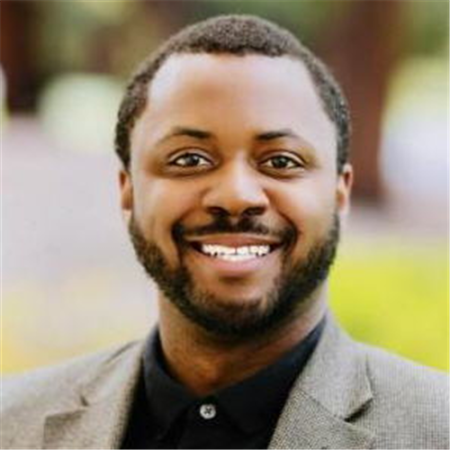
MA POLS and MA/PP students, please contact
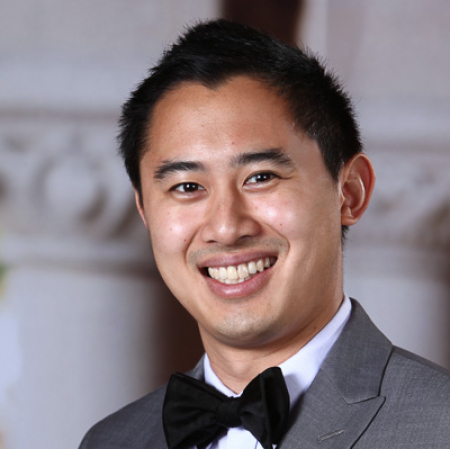
EDS, ICE/IEPA, Individually Designed, LDT, MA/JD, MA/MBA students, please contact
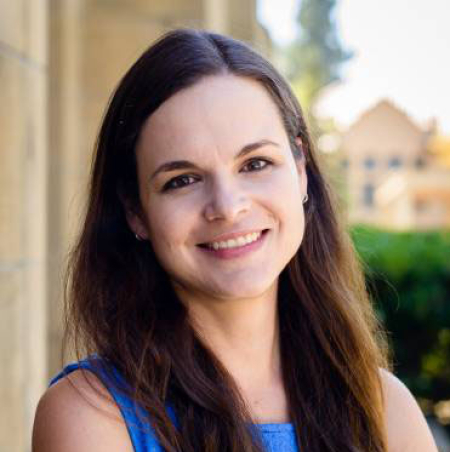
Stanford Graduate School of Education
482 Galvez Mall Stanford, CA 94305-3096 Tel: (650) 723-2109
- Contact Admissions
- GSE Leadership
- Site Feedback
- Web Accessibility
- Career Resources
- Faculty Open Positions
- Explore Courses
- Academic Calendar
- Office of the Registrar
- Cubberley Library
- StanfordWho
- StanfordYou
Improving lives through learning

- Stanford Home
- Maps & Directions
- Search Stanford
- Emergency Info
- Terms of Use
- Non-Discrimination
- Accessibility
© Stanford University , Stanford , California 94305 .

Tips for Completing Your PhD Thesis on Time
Completing a PhD course is undoubtedly one of the most fulfilling pursuits for academics. Recently, however, a new term arose: ABD (“All but Dissertation”). ABD refers to students who have completed their coursework and passed the exam, but have yet to complete and defend their theses. Indeed, ABD students are more common than previously thought. The PhD Completion Project revealed that the ten-year cumulative completion rate for PhD students ranges from 64% (engineering) to 49% (humanities). While not all students advance to the doctoral writing stage before dropping out, a significant portion do, based on these numbers. Leaving graduate school without finishing your thesis has psychological and occupational consequences. Completing your thesis on time is, therefore, essential for career advancement and personal growth.
Overcoming a Time Crunch
Being pressed for time will likely happen, especially if you are holding down a part-time job during your doctoral studies. The pressure to finish is greatest during the last year of your PhD and this is usually the time when conflicts and tensions arise. There are tips that can help you finish your PhD on time , even when you’re pressed for it.
- Prepare an action plan for your last year. This will help you optimize the time that you have left and avoid feeling overwhelmed by all the things that you have to do.
- Clarify your priorities. Ask yourself what you intend to finish first and stick to it. It may be helpful to break down your priorities into smaller and simpler tasks.
- “The truth can wait.” That is, it is vital to start writing your doctoral thesis once you have your data, even if more can be done.
- Know all the rules and regulations of the university. Prepare a list of all the documents and papers that you will need before you need them. This will help you avoid pitfalls in your last year.
- Familiarize yourself with software. Producing scientific documents entails the use of specific programs, such as LaTeX. While the program may not be as easy to understand as other editors, there are marked advantages such as ease in publication and faster manipulation of images.
- Pay attention to your career. While you may think that this is not the best time to think about your career , it is. Your career should follow suit after your doctoral studies, and focusing on what lies ahead will help you frame the current situation.
Key Tasks for Finishing Your PhD on Time
Finishing your PhD thesis on time is not as daunting as it sounds. Although many students will be pressed for time, completing your study is possible with a little ingenuity from your part.
- First, ensure that you meet all the PhD requirements set by your institution. Never presume anything without double-checking with your institution and your supervisor. This can save you from a lot of wasted time and stress.
- Keep a good perspective. Your peers are unlikely to read your thesis , but they are likely to read journals and articles resulting from it.
- Contrary to what most people say, your introduction should be written last. Breaking your thesis into defined stages is important for success. On that same note, your conclusion also should be written last.
- Get familiar with project management applications, such as Trello.
- Buy your own laser printer. This will save you from having to rush elsewhere to have your drafts printed. It will save you time and money as well.
- Get feedback on the entire thesis—from start to finish. Getting feedback for individual chapters is fine, but you should aim to get feedback on the entire work.
- “Begin with the end in mind.” Make sure you know when your doctoral studies are supposed to end, and when your work will be considered as done.
Planning and Writing Your Thesis
Breaking down your tasks into manageable blocks is one way to ensure that you actually finish the entire thing. There are plenty of techniques to help you along the way, such as the 25-minute Pomodoro for academic writing. Undoubtedly, writing your thesis is at least as hard as performing the actual study, but it is never impossible. With the right tools at your disposal and a positive mindset, you can finish your PhD on time. Below is a checklist of things that you need to do to get to graduation day.
- Draft your proposal and research design
- Acquire IRB consent
- Pilot study
- Gather data and information for your study
- Analyze your data
- Write, write, and write some more . Ideally, aim to write for a minimum of 30 minutes a day
- Defend your thesis
Completing your PhD paper on time is definitely possible. Knowing the tips and tricks of the trade can help you to get on your way towards a life in academia.
Thanks for the very useful article to complete the Ph.D. thesis before the deadline. The doctorate course is very difficult for the student so the student could not able to complete the work on time. But your article helps to finish the article to complete the work for the students.
Rate this article Cancel Reply
Your email address will not be published.

Enago Academy's Most Popular Articles
![phd timetable for completion What is Academic Integrity and How to Uphold it [FREE CHECKLIST]](https://www.enago.com/academy/wp-content/uploads/2024/05/FeatureImages-59-210x136.png)
Ensuring Academic Integrity and Transparency in Academic Research: A comprehensive checklist for researchers
Academic integrity is the foundation upon which the credibility and value of scientific findings are…

- AI in Academia
AI vs. AI: How to detect image manipulation and avoid academic misconduct
The scientific community is facing a new frontier of controversy as artificial intelligence (AI) is…

- Diversity and Inclusion
Need for Diversifying Academic Curricula: Embracing missing voices and marginalized perspectives
In classrooms worldwide, a single narrative often dominates, leaving many students feeling lost. These stories,…

- Career Corner
- Trending Now
Recognizing the signs: A guide to overcoming academic burnout
As the sun set over the campus, casting long shadows through the library windows, Alex…

Reassessing the Lab Environment to Create an Equitable and Inclusive Space
The pursuit of scientific discovery has long been fueled by diverse minds and perspectives. Yet…
How to Manage Your PhD Timeline for Smoother Research Completion
7 Steps of Writing an Excellent Academic Book Chapter
Top 12 Potential PhD Viva Questions and How to Answer Them

Sign-up to read more
Subscribe for free to get unrestricted access to all our resources on research writing and academic publishing including:
- 2000+ blog articles
- 50+ Webinars
- 10+ Expert podcasts
- 50+ Infographics
- 10+ Checklists
- Research Guides
We hate spam too. We promise to protect your privacy and never spam you.
I am looking for Editing/ Proofreading services for my manuscript Tentative date of next journal submission:

As a researcher, what do you consider most when choosing an image manipulation detector?
Doctoral Completion & Time-to-degree
This page contains information about degree conferrals, time-to-degree, and retention for doctoral research programs at Stanford. While the most common academic doctoral degree across the university is the PhD, the JSD in Law and the DMA in Musical Arts are also included here. The MD and JD are considered to be professional degrees and are not included. In all cases below, the academic years reported are "summer start years", meaning that the academic year encompasses a period from the start of the summer term through the end of the following spring term. Please see the definitions below the dashboard for more details about how the various metrics presented here are calculated.
More information is available about doctoral program enrollment and demographics , as well as doctoral program admissions . Note that local variation in policy and practice regarding admission, matriculation, and degree conferral may affect the departmental and school-level metrics below.
Methodology & Definitions
Time-to-degree.
Time-to-degree is the length of time in years from the first day of the student's first term of enrollment in their doctoral program to the day of their degree conferral. Time-to-degree measures elapsed time only, not enrolled time. It does not stop and start if a student takes a leave of absence. If a student was enrolled in a master's degree program prior to matriculating in the doctoral program the separate time in the master's program is not included even if it was in the same department as the doctoral program. For this reason, time-to-degree may be lower in some doctoral programs where it is common to require completion of a master's degree prior to matriculation in the doctoral program. If a student switches between doctoral programs, time-to-degree is restarted from the first term of enrollment in the new program. The only exceptions to this restart of the clock are when program changes are the result of departmental name changes or other restructuring, or when the new program has the same CIP code as the original program.
Graduation Rate
As with time-to-degree, the start of the 6-year period used to calculate graduation rates is the first term in which the student is enrolled in a doctoral program, regardless of any prior or concurrent enrollment in a master's program. The 6-year rate is based on elapsed time only, not enrolled time. It is not based on the concept of a cohort year or graduation year, but on the actual matriculation term and degree conferral term. For example, if a student enrolled at the start of Spring 2010 and graduated at the end of Winter 2016, they would count towards the 6-year rate; however, if they instead graduated at the end of Spring 2016, their time to degree would be more than 6 years due to the extra term of enrollment.
Degree Conferrals
Numbers of degree conferrals are reported by summer start year. For example, all degree conferred from Summer 2016 through the following Spring 2017 would be reported under the 2016-17 year.
Entering Cohort Status
An entering cohort consists of all students entering a doctoral program during autumn, winter, or spring quarter of a single academic year, as well as those entering during the preceding summer. Students are considered to be current in their program if they are still actively pursuing that degree or are on an approved temporary leave of absence. "Current students in a different PhD program" are students who were enrolled at one point in the selected program but subsequently moved to another doctoral program at Stanford and are still engaged in doctoral study. Students who are listed as "completed" have successfully conferred their degree in the selected program or, if they have completed a different doctoral program, have changed programs and been awarded a doctoral degree by another program at Stanford. Program changes resulting from department name changes, organizational restructuring, or between programs with the same CIP code are not considered "changes" in this context. Students who are shown as "discontinued" have either left the university without a degree or switched to a non-doctoral degree program (in many cases a master's degree).
Visit the Graduate Admissions website for more information about pursuing graduate study at Stanford.
The data are available for download in Google Drive .
- Data Source(s): PeopleSoft Campus Solutions, Institutional Research & Decision Support
Stanford University is committed to providing an online environment that is accessible to everyone, including individuals with disabilities. If you cannot access this content or use any features on this site, please contact [email protected] to obtain alternate formats.
You may submit feedback on this dashboard through the feedback form .
- Skip to Main
- Job Announcements
- Equity and Inclusion
- Research Scientist
- Graduate Students
- Adjunct Instructors
- Women in Physics
- Applied Mathematical Physics and Fluid Dynamics
- Center for Cosmology and Particle Physics
- Center for Quantum Information Physics
- Center for Quantum Phenomena
- Center for Soft Matter Research
- Experimental Elementary Particle Physics
- Undergraduate Program
- Graduate Program
- Global Ph.D.
Suggested Timeline for Completion of Ph.D. Program
We have set up a suggested timeline below that details information and goals to achieve by a certain point in your five year stay at the university. Additional information regarding program requirements can be found in the department's Student Handbook/Policies & Procedures Manual (NYU sign in required) .
Prior to the beginning of the semester A student who has already taken a course elsewhere equivalent to one of our core courses may satisfy that portion of the core course requirement by achieving a grade of B or better in the relevant preliminary examination given just before the start of the fall and spring terms. Each of these courses has recently been revised to reflect the current state of the field.
Students must satisfy the following core courses during the first year. First Semester
- Computational Physics - Phys-GA-2000
- Classical & Quantum Mechanics I - Phys-GA-2011
- Electromagnetism - Phys-GA-2005
Second Semester
- Classical & Quantum Mechanics II - Phys-GA-2012
- Practicum in Teaching - Phys-GA-2090 - this course is designed to prepare you for your teaching duties.
- Statistical Physics - Phys-GA-2002
Summer Students should be prepared to carry out a research project under the guidance of a faculty member during this time. Students who conduct research projects will be eligible for support during their first summer. Planning for the selection of a thesis research area should begin in the first year.
Second Year
Prior to the beginning of the semester You must complete all core course requirements before the beginning of your second year to be considered as making satisfactory progress toward your Ph.D. If one or more of the core courses is not satsfied, the Graduate Qualifications Committee will review your record; a result could be a dismissal from the Ph.D. program, which requires a vote of the faculty.
Course requirements beyond the core Students are required to take at least 4 advanced courses in the Physics Department beyond the core level, not including research and reading courses or the Practicum. At least two of these courses must be outside the student's research area, as determined by the student's advisors and the DGS. Students whose research would benefit from an advanced science course outside of the physics department may propose to have this course counted toward this requirement. This request should be made in writing and should explain how the course content relates to the student's thesis topic and research. This request must be made prior to enrolling in the course.
First Semester Students should be registered in advanced physics courses and/or research credits totaling 9-credits per term for full-time status. Students who are registered for less than 9 credits of elective courses must conduct reading/research for credit or request full-time equivalency. Students are required to have experience in experimental physics. This requirement may be satisfied by taking the course Phys-GA-2075 Experimental Physics. Alternatively, a student may conduct an independent Experimental Project and take an oral examination on the project. Students conducting a project are strongly encouraged to complete the project by October of their second year, and not later than December of their second year. If this deadline is not met, the student will be required to take the Experimental Physics course.
Second Semester Students should be registered in advanced physics courses and/or research credits totaling 9-credits per term for full-time status. Students who are registered for less than 9 credits of elective courses must conduct reading/research for credit or request full-time equivalency.
Summer By the beginning of May of the student's second year, the student is usually expected to have arranged for thesis supervision with a member of the Physics faculty. Shortly thereafter (within a few months) a four-person Thesis Committee, chaired by the thesis advisor is set up. The membership of the Thesis Committee is proposed by the advisor in consultation with his/her student, and must be approved in writing by DGS to insure breadth and level of expertise. Students are urged to thoroughly investigate, by speaking with individual faculty members and the Director of Graduate Studies, the opportunities for support as a Research Assistant while thesis research is being performed. A student holding a Research Assistantship during a summer will receive a stipend for that period of time. A limited number of teaching assignments are available each summer. Interested students should apply for a teaching position by contacting the Undergraduate Administrator. In general, beyond the first summer, RA or adjunct faculty assignments provide the only guaranteed departmental sources of summer support.
First Semester
- Students should be registered for advanced courses or reading research credit towards completing the 72-credits PhD. degree requirement. Students registered for less than 9 credits may request Full-time equivalency.
- An Oral Qualifying Examination is administered by the Thesis Committee before May of the student's third year. This progress report includes a formal proposal for your thesis research, submitted to the thesis committee.
- The Qualifying Examination marks the student's formal entry into dissertation research under the supervision of their thesis advisor. It takes place after the student has already embarked on preliminary research with his or her advisor, and is administered by the student's Thesis Committee. Students are expected to arrange a meeting of their thesis committee before the oral qualifying exam. The purpose of this meeting is to present the committee with an overview of the thesis topic. The Thesis Committee will then inform the student of the physics they may be questioned on in the oral exam. Generally, the range of topics questioned will by broad in scope and include knowledge from advanced course work a student has taken in their field research.
- Course requirements should be completed by the second semester of a student's 3rd year.
- The Oral Qualifying Examination must be satisfied by the end of May of a student's 3rd year.
Fourth Year
Register for additional courses or Reading/Research credits.
Maintaining Matriculation Students who have satisfied all course requirements and have completed 72 credits toward their PhD may remain enrolled by registering for maintenance matriculation. (Note: To be considered an active student enrolled in the PhD. program, students must be registered every term.) Requests to register for maintenace matriculation must be sent to the Graduate Program Administrator . Students maintaining matriculation, if they qualify, may be certified as "full-time" by completing a "full-time" equivalency form .
First Semester Maintain matriculation. Thesis research continues.
Second Semester Maintain matriculation. Thesis research continues.
Prior to the beginning of the semester This is the time to start thinking about your job search. Postdoctoral applications deadline for the following academic year are usually in November and December of this time. NYU has an office of Career Services that you should consider visiting. Their webpage is http://www.nyu.edu/careerservices. They offer a variety of programs that include help with resume writing, mock interviews and job fairs.
First Semester Maintain matriculation. Thesis Research continues.
Second Semester You should now be completing your Ph.D. dissertation and preparing for the Oral Thesis Defense, conducted by your Thesis Committee, augmented by one additional faculty member.
Beyond the Fifth Year
Support is sometimes available past the fifth year for students who have not finished their dissertation.
For students who have finished their dissertation, some teaching opportunities for an additional semester have been available in the past, but students should not rely on this as there is no guarantee this will continue.

- Code of Ethics
- Dissertation Editing
- Dissertation Coaching
- Free Consultation
How to Create a Dissertation Timeline (With Examples + Tempate)
When it’s time to start thinking about writing your dissertation, it is vital to put together a dissertation timeline. This will help you map out the months you will be spending on your dissertation, and ensure that you’re staying on track. A specific and detailed dissertation timeline will serve as an outline to guide you, step by step, through what can be a long and challenging process.
While we often refer to a dissertation in a way that makes it sound like a monolith, in reality, a dissertation consists of many moving parts. A dissertation timeline includes a series of milestones that leads up to the dissertation defense , revisions, and final submission of your dissertation. Constructing an outline of every step in the dissertation process , including rough estimates of how long each will take, will give you a realistic picture of where you are in the process at any given time.
Before embarking on your dissertation, it is a good idea to meet with your dissertation advisor and sketch out a dissertation timeline that is realistic for the size and scope of your project and includes deadlines. This will provide you with much-needed structure and a sense of what will happen next. To get an idea of what a completed dissertation looks like and the components your program requires, ask to see samples from recent graduates in your department.
These are a few frequently asked questions about crafting a dissertation timeline:
- What does a dissertation timeline look like?
- What goes in a dissertation timeline?
- How structured should a dissertation timeline be?
- What do you do with a dissertation timeline?

What Does a Dissertation Timeline Look Like?
One way to think about a dissertation timeline is as a kind of outline. While the outlining process is unique to each writer, there are commonalities shared by all of them. Likewise, when writing a dissertation timeline, you’ll want to include all of the basic elements of your dissertation as well as the amount of time you think you’ll need to execute them.
The best dissertation timeline format is the one that works for you. Though I’ve reformed somewhat over the years, for a long time I wasn’t a fan of intensely detailed outlines. Many people don’t like outlines. And that’s okay! However, writing a dissertation is not the time to be flying by the seat of your pants. To get started, a simple, linear timeline that projects the amount of time you think you’ll need to write your dissertation will suffice.
Example Dissertation Timeline
Below, you’ll find an example of a dissertation timeline, which you can view as an image in your browser or download as a spreadsheet. Feel free to use the spreadsheet as a template as you build your own dissertation timeline.
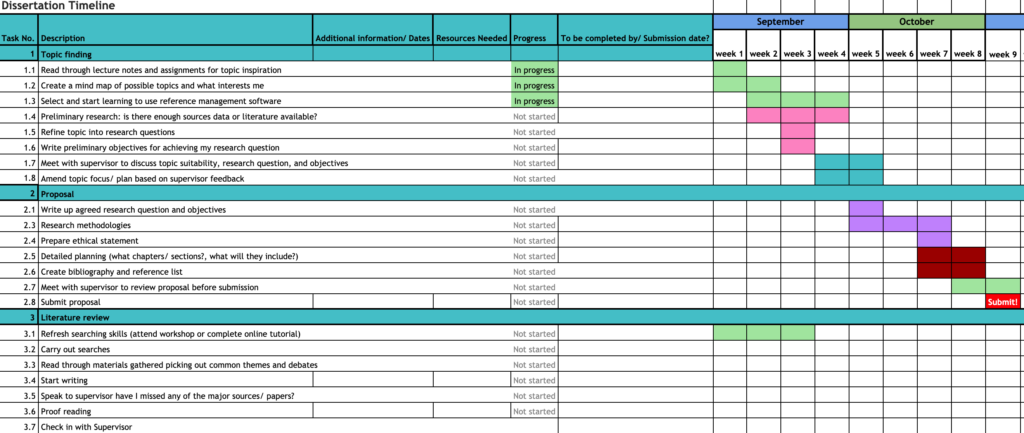
Or download the spreadsheet below:
Inclusion in a Dissertation Timeline
When constructing your dissertation timeline, include every element of the dissertation from the abstract to the conclusion. Keep in mind that you may not be writing your chapters in chronological order. For instance, after completing their first round of research and writing their research question, most graduate students will tackle their literature review next, even though it comes after the abstract and introduction in the final document.
Depending on the field being studied, most dissertations will also include sections for methodology, results, and discussion. Many programs also require a detailed conclusion that alludes to future research possibilities. Every dissertation also has an extensive list of references (pro tip: write this as you’re writing your dissertation), as well as appendices for charts, graphs, and other ephemera. And don’t forget your acknowledgments!
Dissertation Timeline Structure
The structure of your dissertation timeline will take shape once you’re engaged in the research process. While a road map may seem like an apt metaphor for a dissertation, once you get started you may notice a lot of starts and stops and circling back. After you’ve begun researching, you may realize that you need to allot more time for digging through the databases, or you may discover that you need to reformulate your research question entirely.

I’ve seen many of my own graduate students use calendars to great effect, giving themselves hard and fast deadlines to meet. Many students also build out their dissertation timelines as they progress, attaching working drafts of their abstract, introduction, and literature review to their timeline within a giant spreadsheet that links to multiple documents and sources. All of these methods are valid. Devise one that works for you.
Using a Dissertation Timeline
So once you have a thoughtful, soundly-constructed dissertation timeline, what do you do with it? First, and most importantly, try your best to adhere to it. Check in with your dissertation timeline regularly, and use it to keep yourself on track. Also, make adjustments to it as needed. If you find yourself breezing through your preliminary research but needing a bit more time for your literature review, consult your timeline and adjust accordingly.
While meeting your deadlines is important, also construct your dissertation timeline with an understanding that many graduate students face delays once they start working on their dissertation. These can include hold-ups at the department or university level in the form of late IRB approval or limited lab space or grant funding that gets cut. Anything can happen, but having a dissertation timeline will help you get back on track as soon as the storm passes.
In my own experience, I also found my dissertation timeline to be a great document to share and discuss with my dissertation chair and committee. Once I finished my comprehensive exams, I met with members of my dissertation committee and got feedback on my rough dissertation timeline to make sure my goals for submitting my dissertation and graduating were realistic. This also ensured that we were all on the same page.
When writing a dissertation, timing is everything. Creating a dissertation timeline gives you definitive time limits for research and writing, and it also influences several other major decisions that you’ll need to make. These include preparation to go on the job market, which often coincides with writing your dissertation. There is no doubt that this will be a hectic time in your graduate school career, but having a well-organized dissertation timeline is a good way to keep everything in perspective.
Related posts:

Courtney Watson, Ph.D.
Courtney Watson, Ph.D. is an Associate Professor of English at Radford University Carilion, in Roanoke, Virginia. Her areas of expertise include undergraduate and graduate curriculum development for writing courses in the health sciences and American literature with a focus on literary travel, tourism, and heritage economies. Her writing and academic scholarship has been widely published in places that include Studies in American Culture , Dialogue , and The Virginia Quarterly Review . Her research on the integration of humanities into STEM education will be published by Routledge in an upcoming collection. Dr. Watson has also been nominated by the State Council for Higher Education of Virginia’s Outstanding Faculty Rising Star Award, and she is a past winner of the National Society of Arts & Letters Regional Short Story Prize, as well as institutional awards for scholarly research and excellence in teaching. Throughout her career in higher education, Dr. Watson has served in faculty governance and administration as a frequent committee chair and program chair. As a higher education consultant, she has served as a subject matter expert, an evaluator, and a contributor to white papers exploring program development, enrollment research, and educational mergers and acquisitions.
Comments are closed.
How to Finish Your Dissertation in Half the Time
Learn how to avoid the pitfalls preventing you from finishing your dissertation faster.
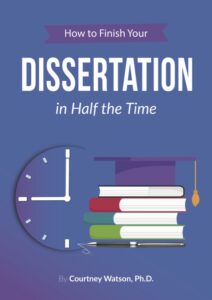
Subscribe to Get the FREE eBook!
Dr. Courtney Watson In the News
“ See It for Yourself ” in With Good Reason: Beyond the Book July 22, 2022
“ I Thought You’d Never Ask: Consent in Contemporary Romance ” in New Frontiers in Popular Romance (McFarland) June 13, 2022
- Common Errors
- Dissertation Success
- Presentation
- Quantitative Analysis
- Surviving Grad School
“How to Finish Your Dissertation in Half the Time”
Subscribe to get the free eBook!
Imperial College London Imperial College London
Latest news.

Seven Imperial researchers awarded Academy of Medical Sciences Fellowships

Discover the undergraduate startups tackling global challenges

US health research agency ARPA-H sets out funding vision during Imperial visit
- Department of Electrical and Electronic Engineering
- Faculty of Engineering
- Departments, institutes and centres
- Postgraduate research (PhD)
Timeline of a PhD
A typical PhD, taken over 3-4 years, is structured as follows:
First three months
During your first 3 months you settle in and prepare an initial research plan with your supervisor.
Your research plan gives a statement of the general topic area, an initial formulation of the issues to be addressed, a list of principal references on which the work will draw, and objectives for the first year of study. Your supervisor may also ask you to attend some of the undergraduate lectures.
You will also need register for the Graduate School's Professional Skills programme . If you are a non-native English speaker you will also have your English language ability assessed.
First six months
You can expect to spend your first 6 months undertaking literature searches and defining your project. You will have regular meetings with your supervisor. You will also meet the personal tutor (a member of staff from a different research group).
Months 7-18
You continue to work on your research project, and will have the opportunity to attend the Graduate School's Professional Skills courses on advanced writing, career planning, presentation and progressing.
An Early Stage Assessment is submitted by the end of month 9.
This report sets out the main research areas, details of work done so far, and a programme for future work. You attend an interview with one or two assessors and your supervisor. This assessment confirms your suitability to continue with your PhD programme.
You will have also attended some, or all of, the Graduate School's Professional Skills training on topics such as professional conduct, project management, and a residential course on research skills and development.
Months 18-24
Late stage review (22 months after registration).
You will be required to submit a report that contains the contents page for your thesis, a statement of expected contributions, achievements to date and a plan for completion of work and thesis. You will be assessed by interview with one or more assessors and your supervisor.
Months 24-36
You continue working on your research project. You will also have the opportunity to attend courses on career planning, and completing your research.
At the end of 36th month, you will complete a Progress Review, which will determine whether you will be moving up to the writing up status or maintain active registration.
Months 36-48
Progress Review ( at 36 months ). It is decided whether you should move to writting up stage or have your acitve registration extended.
Thesis submission ( by the end of 48th month )
Your thesis is your account of the work you have done, which should form a distinct contribution to the knowledge of the subject and show evidence of originality by the discovery of new facts and/or the exercise of independent critical power. The thesis is examined by an oral exam. There are two examiners: one from Imperial College and one from another university. The oral exam usually lasts for 2-3 hours, and you will find out the result immediately after the exam.
- UB Directory
- Graduate School of Education >
- Information for Current Students >
- Learning and Instruction Current Student Resources >
Dissertation Checklist and Timeline
Completing all of the crucial steps to the dissertation process can be complicated. Time and task management will be key to your success. Review the suggested tasks and print out this checklist to assist you in your dissertation journey.

Maromolecular Science and Engineering
CHANGING THE WORLD ONE MOLECULE AT A TIME
Ph. D. Major Option Course Plans
Home / Admissions / Ph. D. / Ph. D. Major Option Course Plans
Biomaterials Engineering
- A minimum of 25 hours of coursework must be elected, including at least 12 hours in Macromolecular Science and Engineering and at least 12 hours in biomaterials.
- Macro courses must include 512, 530, and 538.
- The biomaterials courses should include courses in biomaterials, biochemistry, and biophysics.
Biomedical Engineering
- A minimum of 25 hours of coursework must be elected, including at least 12 hours in Macromolecular Science and Engineering and at least 12 hours in Biomedical Engineering.
- The Biomedical Engineering courses should include at least one course in biomaterials, biochemistry, or biophysics in addition to courses in Biomedical Engineering.
- BME Graduate Courses
Chemical Engineering
- A minimum of 25 hours of coursework must be elected, including at least 12 hours in Macromolecular Science and Engineering and at least 12 hours in Chemical Engineering.
- The Chemical Engineering courses should include a course on transport phenomena, numerical methods or mathematical modeling, and a course on polymer processing.
- ChE Graduate Courses
Chemistry (Synthetic or Physical)
- A minimum of 25 hours of coursework must be elected, including at least 12 hours in Macromolecular Science and Engineering and at least 12 hours in Chemistry.
- Chem 507, 511, 518, 536, 540, 543 (select at least two from this list)
- Chemistry courses should include Chem 571, 576, and 580.
Materials Science and Engineering
- A minimum of 25 hours of coursework must be elected, including at least 12 hours in Macromolecular Science and Engineering and at least 12 hours in Materials Science and Engineering.
- MSE Graduate Courses
Organic Electronics and Photonics
- A minimum of 25 hours of coursework must be elected, including at least 12 hours in Macromolecular Science and Engineering and at least 12 hours in the field of organic electronics.
- Organic Electronics and Photonics courses should include a course in device physics, device applications, and device fabrication.
- EECS Graduate Courses
- A minimum of 25 hours of coursework must be elected, including at least 12 hours in Macromolecular Science and Engineering and at least 12 hours in Physics.
- Physics 505, 506, 510, 511, 512, 520, 540 and 541 (select at least two from this list)
- Physics Graduate Courses
Individualized Option
An individualized option may be proposed by students who already have a Master’s degree or other graduate experience. Students should submit a detailed course plan in writing for approval by the Executive Committee. Students must substantiate that they have sufficient depth of knowledge and skills from their previous work to qualify for the individualized option. A maximum of 9 credits (3 courses) of past graduate work may be utilized as a part of this option.

- Already have a WordPress.com account? Log in now.
- Subscribe Subscribed
- Copy shortlink
- Report this content
- View post in Reader
- Manage subscriptions
- Collapse this bar

Engineering student works to improve water infrastructure
Tolulope odunola is driven to make an impact in developing communities.

After earning her bachelor's degree in civil engineering at a premier university in Nigeria, Tolulope Odunola became fascinated by the world of hydrology and water systems and set off to continue her education in environmental engineering.
She came to the University of Cincinnati for her master's degree, and the experience left such an impact she stayed for her doctorate, working under the guidance of Patrick Ray, associate professor of environmental engineering.
Odunola was named Graduate Student Engineer of the Month by the College of Engineering and Applied Science.
Why did you choose UC?
My journey to the University of Cincinnati was quite an interesting one. I grew up in Nigeria and after earning a bachelor's degree in civil engineering, I was convinced that I needed both the exposure and improved skillset that an overseas graduate education would provide. The University of Cincinnati was not on my list initially, but upon recommendation, I browsed through the school's website and faculty profiles in my program of choice.
After I arrived at UC, I was captivated by the beautiful architecture on campus and the diversity of nationalities represented here.
Tolulope Odunola, Graduate Student Engineer of the Month
Tolulope Odunola
My quick survey of the university revealed that UC held much promise for my development academically and careerwise, so I did not delay in submitting my application for a master's degree in environmental engineering .
I applied to UC a few days before the deadline in 2019 and I am so glad I made the right choice. After I arrived, I was captivated by the beautiful architecture on campus and the diversity of nationalities represented here.
Why did you choose your field of study?
I am pursuing my doctorate in environmental engineering after obtaining my master's degree in the same program in 2022. I have a bachelor's degree in civil engineering, and the little story of how I ended up in the field of engineering begins when I was in high school. Back then, I enjoyed science and mathematics, but I also loved fine arts and technical drawing, so I wanted a discipline that combined both innovative creativity and computation prowess. I explored the field of environmental design first and considered architecture, but I eventually decided on civil engineering, in part due to the broader scope of the field.
As an undergraduate student, I learned about the environmental aspects of civil engineering. With time, water and environmental engineering began to stand out to me amongst other areas of specialization. I observed that there was still much room to contribute to the practice of environmental engineering in Nigeria, as well as to improve the standards, management, and sustainability practices of water resources and waste management systems. By the final year of my undergraduate program, I decided I would go onto graduate school to learn more about environmental engineering and gain skills in the area. This is how I ended up at UC in the Water Systems Analysis group under the supervision of Dr. Patrick Ray.
Briefly describe your research work. What problems do you hope to solve?
Under the guidance of Dr. Patrick Ray, Tolulope Odunola has presented her research at several conferences, including the American Geophysical Union Fall Meeting.
My research is focused on improving the economic evaluation of water resource projects under changing climate conditions.
My goal is to make significant contributions to decision science. The design, planning and operation of water projects like irrigation dams and water supply networks is affected by climate change because the amount of water that will be available in the future for such projects is uncertain.
While climate science has advanced in recent years, there is still room for improvement to standard economic evaluation using climate vulnerability assessment methodologies.
My research aims to provide decision makers in water resources engineering with robust analysis frameworks, tools, and decision metrics for confident investment decisions under climate uncertainty. I am also exploring spatial and distributional equity considerations in economic evaluation under climate change.
Odunola is advised by Associate Professor of Environmental Engineering, Patrick Ray.
Research at UC has been positively demanding and rewarding. I am thankful for my adviser, Patrick Ray , who introduced me to the world of development projects planning, climate vulnerability assessment and decision science.
I have enjoyed working on practical projects, learning new skills, and collaborating with multidisciplinary project teams. For instance, I was funded by the Millennium Challenge Corporation for three years which introduced me to the work culture in a typical development agency.
I have learned to present my research to a non-technical audience and to understand and be considerate of different perspectives of water engineering systems modeling under climate change. I have had to think like an economist, an urban planner and an agronomist while building my hydrological models and approaching scenario analysis under climate change, for example.
I would say this is one of the blessings of graduate school — it eliminates myopic approaches to anything in life, research included.
What are some of the most impactful experiences during your time at UC?
I have been privileged to attend and present at the American Geophysical Union fall meeting several times as well as the American Society of Civil Engineers' EWRI Congress. These conferences inspired and encouraged me to work harder on my research and make significant contributions to both science and industry. There was also the additional advantage of visiting and touring new cities during the conferences.
Traveling for work and presentation sessions at the Millennium Challenge Corporation office in Washington, D.C., had a huge impact on me. I once toured D.C. with my family as a teenager. To return almost a decade later for work as a graduate student was amazing, to say the least. As you can expect, I took a selfie with a caption of my thoughts on the busy morning streets of D.C. and shared it with my family back home in Nigeria.
What are a few of your accomplishments of which you are most proud?
Winning the Outstanding Student Presentation Award for the Hydrology Section at the AGU Fall Meeting in 2023, and the 2024 People's Choice Award at the University of Cincinnati's three-minute thesis competition are definitely at the top of my list.
I also have been a two-time recipient of the American Water Works Association Ohio Chapter Graduate Scholarship. Recently, I was awarded the Graduate Student Government Research Fellowship.
I am deeply grateful for the honor that accompanies these feats, but equally important and impactful was the process leading up to these awards during which I developed my research dissemination, writing, and presentation skills.
When do you expect to graduate? What are your plans after earning your degree?
I aim to graduate within the next year and my plan is the same as it was in the fall of 2019 when I arrived at UC: to make an impact in human communities, one sustainable water resource project at a time. I look forward to being employed in the water industry as a water resource analyst and planner, and specifically I hope to work in an international development or foreign aid agency to provide developing countries with water infrastructure that is robust to uncertainties such as climate change.
Do you have any other hobbies or involvements you'd like to share?
Outside of research, I enjoy reading historical fiction novels, creative writing, and exploring the beauty of nature. UC has also afforded me many leadership opportunities.
First, with the Nigerian Students' Association where I served as Secretary and three-time Electoral Committee Chairperson. Also, I have served for two tenures as the Vice President of my department's Graduate Student Association.
Plus, I had growth, leadership, and ministry opportunities by serving with Every Nation here at UC. I will always be grateful for the relationships I have made as a graduate student at UC; my church family, research group colleagues, Nigerian friends who made Cincinnati a home away from home, and several others too numerous to mention!
Featured image at top: Tolulope Odunola is studying ways to improve the infrastructure that provides clean drinking water. He was named UC's Graduate Student Engineer of the Month by the College of Engineering and Applied Science. Photo/Pixabay
Interested in becoming an engineering Bearcat?
Check out the graduate programs offered by the College of Engineering and Applied Science.
- Student Experience
- College of Engineering and Applied Science
- Chemical and Environmental Engineering
- Civil and Architectural Engineering and Construction Management
Related Stories
Engineering students showcase capstone projects at ceas expo.
May 6, 2022
Graduating engineering undergraduates from the University of Cincinnati’s College of Engineering and Applied Science gathered for the inaugural CEAS Expo in April to showcase their senior capstone projects to more than 500 attendees, including faculty, staff, alumni and industry representatives. The event, organized by the college and CEAS Tribunal student government, was held in downtown Cincinnati at the Duke Energy Convention Center.
Engineering students present senior capstone projects digitally
April 24, 2020
Engineering students present at third annual Expo
April 24, 2024
This spring, senior students at the University of Cincinnati's College of Engineering and Applied Science came together to present their final capstone projects at the third annual CEAS Expo. College faculty, staff, alumni and industry professionals attended the event to witness the innovation that is created at CEAS.
Search Icon
Events See all →
Hands on history.

10:00 a.m. - 2:30 p.m.
Penn Museum, 3260 South St.
268th Commencement

Franklin Field
Vahe Sarkissian

World Cafe Live, 3025 Walnut St.
Wawa Welcome America Day
10:00 a.m. - 5:00 p.m.
Campus & Community
Two international students honored with the 2024 Penn Global Student Citizenship Award
Aishwarya pawar, a ph.d. student at the perelman school of medicine, is the graduate student winner, and david kato, a fourth-year political science major in the school of arts & sciences, is the undergraduate winner..
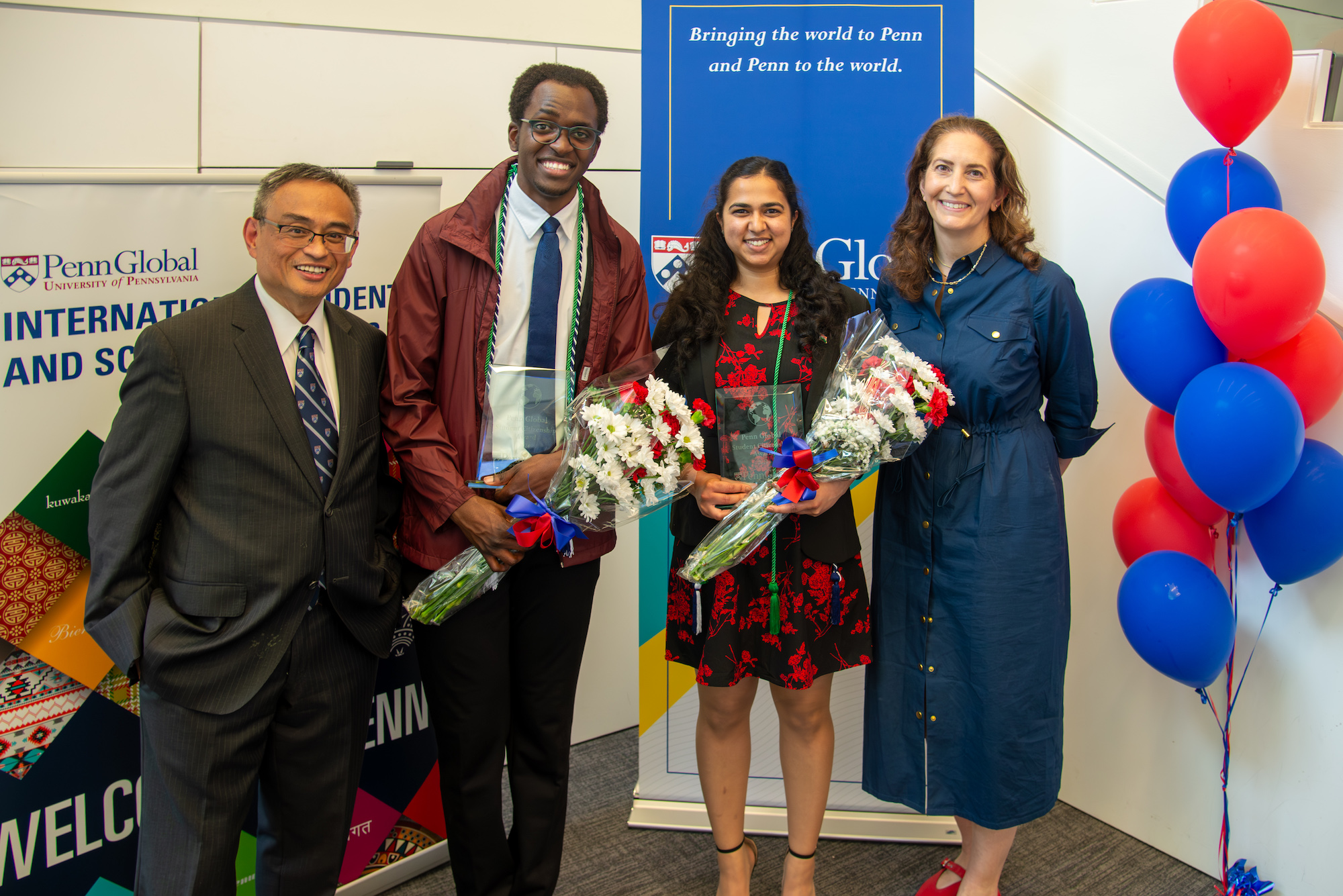
University of Pennsylvania international students Aishwarya Pawar and David Kato have been named as the winners of the 2024 Penn Global Student Citizenship Award , which honors international students who have exemplified a spirit of global citizenship during their time at Penn.
Pawar, a Ph.D. student in cell and molecular biology at the Perelman School of Medicine who came to Penn from Pune, India, is the graduate student winner; Kato, a fourth-year political science major in the School of Arts & Sciences from Kigali, Rwanda, was named the undergraduate winner.
The awards were handed out as part of Penn Global ’s International Student and Scholar Services graduation reception, held at Perry World House for the more than 2,100 international students. The reception celebrated the accomplishments of graduating international students during their time at Penn.
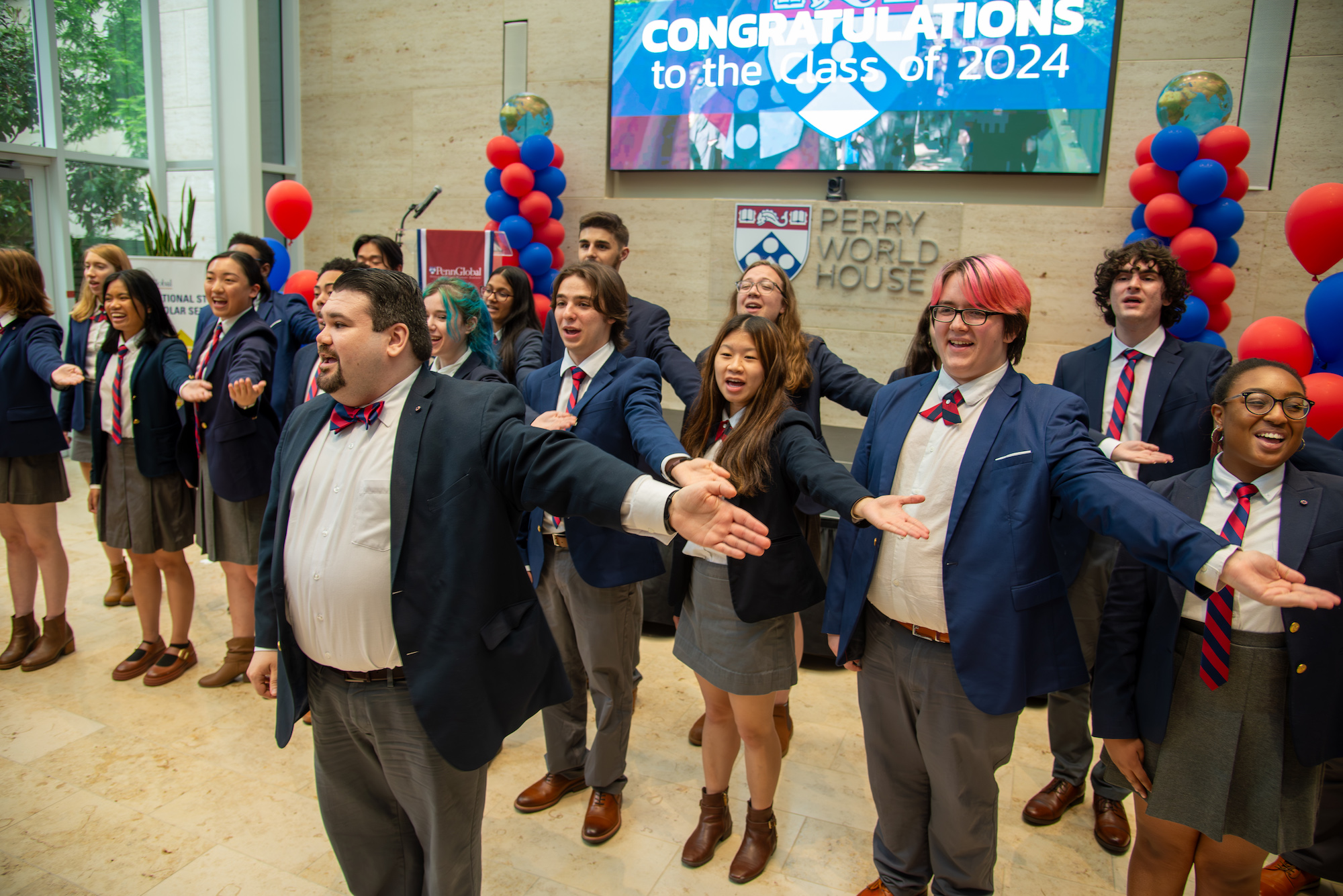
“Penn would not be what it is today—a vibrant, intellectual hub for innovation and impact—without international students,” says Associate Vice Provost for Global Initiatives Amy Gadsden . “The richness of their experiences and unending drive to transform our campus and the world continuously elevate the University to new heights. The Penn Global Student Citizenship Award and reception are our way of celebrating international students’ contributions, large and small, but no less influential, to life at Penn.”
The award reflects Penn Global’s commitment to honor international students who, during their time on campus, prioritized the office’s global mission to “bring the world to Penn and Penn to the world.”
This marks the ninth year Penn Global has presented the award. “We are incredibly proud of this tradition and what it represents: a celebration of Penn’s international students as indispensable, impactful members of the University,” says Rudie Altamirano , executive director of International Student and Scholar Services.
Pawar and Kato each received a trophy, and their names will also be displayed on a plaque in the ISSS office.

Altamirano says Pawar’s “unwavering dedication to her role as the graduate chair of the International Student Advisory Board (ISSS) is evident in her consistent efforts to uplift and advocate for the welfare of international students. Aishwarya’s compassion and big heart make her a role model among her peers.”
Gadsden notes the “incredible impact” Kato has made on Penn’s campus during his four years. “As an active international student leader and World House Student Fellow, among other things, David used his perspective and experience to raise important issues facing the entire undergraduate international community. He has consistently been a welcome and thoughtful presence in meetings and discussions.”
Penn Global and ISSS also gave two honorable mentions to graduates and undergraduates. The graduate honorable mention awardees were Gaurav Mangal , an electrical engineering master’s student in the School of Engineering and Applied Science , and Sparsh Maheshwari , a master’s student in nonprofit leadership with a dual degree in social policy and data analytics in the School of Social Policy & Practice .
The undergraduate honorable mention awardees were Leah Tesfa , a mechanical engineering fourth-year student in Penn Engineering from Harare, Zimbabwe, and Carolina Yuka Nakada , a mechanical engineering and computer science major and a robotics master’s student in Penn Engineering from São Paulo, Brazil. Tesfa is also a robotics master’s student and the Penn World Scholar of the Year.
Class of 2025 relishes time together at Hey Day
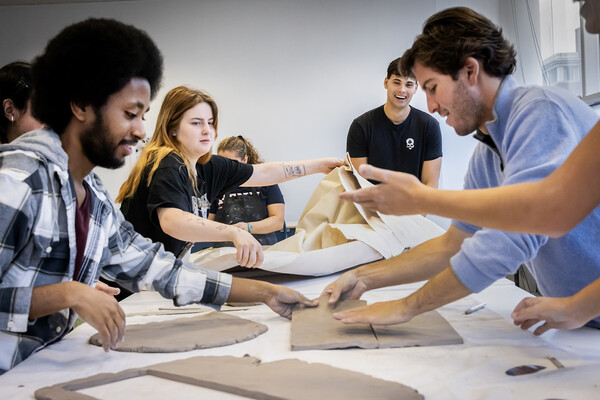
Arts, Humanities, & Social Sciences
Picturing artistic pursuits
Hundreds of undergraduates take classes in the fine arts each semester, among them painting and drawing, ceramics and sculpture, printmaking and animation, photography and videography. The courses, through the School of Arts & Sciences and the Stuart Weitzman School of Design, give students the opportunity to immerse themselves in an art form in a collaborative way.

Penn celebrates operation and benefits of largest solar power project in Pennsylvania
Solar production has begun at the Great Cove I and II facilities in central Pennsylvania, the equivalent of powering 70% of the electricity demand from Penn’s academic campus and health system in the Philadelphia area.

Education, Business, & Law
Investing in future teachers and educational leaders
The Empowerment Through Education Scholarship Program at Penn’s Graduate School of Education is helping to prepare and retain teachers and educational leaders.

‘The Illuminated Body’ fuses color, light, and sound
A new Arthur Ross Gallery exhibition of work by artist Barbara Earl Thomas features cut-paper portraits reminiscent of stained glass and an immersive installation constructed with intricately cut material lit from behind.

IMAGES
VIDEO
COMMENTS
Example: Planning year 2 of a 3-year PhD. Maria completed her first round of data collection according to plan, and starts the second year of her PhD with a lot of material. In her second year, she will focus on turning this data into two journal articles. Months 1-2: Maria works on her data analysis.
Transfer of registration from MPhil to PhD (between 9-18 months, but as. early as reasonable). 24 months: Submission and assessment of second year progress report on research log. Agreement of thesis structure and strict timetable. for thesis writing . 30 months (not less than 4 months before expected date of submission
Success in any PhD program depends, to a large extent, on effective time management and keeping track of progress through a thoughtfully crafted PhD timeline. Start with outlining all your major requirements: ... Create Your PhD Timeline for a 3 year completion. Creating a timeline for a 3-year PhD program requires careful planning, as you'll ...
Hand in of an advanced literature review, thesis plan and timetable for completion. This will then be discussed in the MPhil upgrade review with two internal examiners. 18 months: Biannual review with your supervisor(s) to discuss your progress to date and feasibility of completing on time. 2 years
Here are 8 major milestones of a PhD program: Milestone 1: Through consultation with your advisor, check whether there are any special graduation requirements other than the university and department that you may have to complete as part of your program. Milestone 2: The supervisory committee must be formed within one year of the doctoral ...
Next, explain the time duration. The time required to complete each goal, roughly. For example, a semester or a year to complete the course work or 4 to 8 months for completion of ethical approval. Now two things must be known to you, at this point in time. First, enlist the time required to complete each objective, as aforementioned.
MILESTONE #2: Completion of both of the following two separate steps: Qualifying exam completed. Dissertation proposal approved (Advancement to Candidacy) One year past Milestone #1, not to exceed four years from beginning of program. MILESTONE #3: Dissertation completed within four years past Milestone #2, not to exceed a total of seven years ...
How the PhD Program Works. Completing your doctorate at Wharton requires 5 years of full-time study. The first 2 years in the program prepare you for admission to candidacy by taking courses, qualifying exams, and starting research projects. In the last few years, you are primarily conducting research full-time including writing and defending ...
PhD Completion Process. Congratulations! As a PhD student, you have spent spend significant time at the University of Rochester taking courses, completing research in your field, completing milestones and are now ready to complete your degree. The final requirement in earning a PhD degree is the completion and defense of the doctoral dissertation.
Published: July 12, 2018 4:01pm EDT. Many students enrol in a Master or PhD postgraduate research degree, but few complete them. From 2010-2016, 437,030 domestic and international students ...
A PhD, or doctorate degree, is the highest degree you can earn in certain disciplines, such as psychology, engineering, education, and mathematics.As a result, it often takes longer to earn than it does for a bachelor's or master's degree.. While many PhD programs are designed to be finished in four or five years, the average completion time is much longer when you factor in the time it ...
Year 3. Submit dissertation proposal to committee (by end of September) Advance to Candidacy (by end of October) Submit NSF DDIG proposal (October) Perform field or lab research. Submit manuscript for completed lab or field work (by end of summer)
Late-January: Course registration deadline (previously known as "Study Card Day"). Mid-February: Deadline for submitting materials to be reviewed at the March CHD meetings. G1s: Your Prospective Program Plan due to the Office of Academic Programs on this day. Transfer of up to 3 classes of coursework may be allowed.
How I Made My PhD Completion Plan on Excel (With Template) For the last few weeks, I've been working on my PhD completion plan. It's basically an excel spreadsheet that I'm using to track my progress and plan my time for the remainder of my PhD. My thesis is due August of next year (with a 6 month extension) so the clock is definitely ticking.
Graduate! Each of these steps requires action and documentation by the student. At various times, the faculty advisor, Doctoral Programs Officer, Area Committee, or other entities participate in the completion of degree requirements. Students must ensure that each step is completed and that all appropriate parties have taken the necessary actions.
The PhD Completion Project revealed that the ten-year cumulative completion rate for PhD students ranges from 64% (engineering) to 49% (humanities). ... With the right tools at your disposal and a positive mindset, you can finish your PhD on time. Below is a checklist of things that you need to do to get to graduation day. Draft your proposal ...
Courses of study in anthropology vary considerably across sub-disciplines and from student to student. Students should work closely with their faculty advisers to devise a timetable that suits their individual circumstances. Below is a suggested timeline for completing requirements for the Ph.D. in a timely manner. First Year:
Doctoral Completion & Time-to-degree. Main content start. This page contains information about degree conferrals, time-to-degree, and retention for doctoral research programs at Stanford. While the most common academic doctoral degree across the university is the PhD, the JSD in Law and the DMA in Musical Arts are also included here. The MD and ...
(Note: To be considered an active student enrolled in the PhD. program, students must be registered every term.) Requests to register for maintenace matriculation must be sent to the Graduate Program Administrator. Students maintaining matriculation, if they qualify, may be certified as "full-time" by completing a "full-time" equivalency form.
A dissertation timeline includes a series of milestones that leads up to the dissertation defense, revisions, and final submission of your dissertation. Constructing an outline of every step in the dissertation process, including rough estimates of how long each will take, will give you a realistic picture of where you are in the process at any ...
A typical PhD, taken over 3-4 years, is structured as follows: ... achievements to date and a plan for completion of work and thesis. You will be assessed by interview with one or more assessors and your supervisor. Months 24-36. You continue working on your research project. You will also have the opportunity to attend courses on career ...
Dissertation Checklist and Timeline. Completing all of the crucial steps to the dissertation process can be complicated. Time and task management will be key to your success. Review the suggested tasks and print out this checklist to assist you in your dissertation journey.
A minimum of 25 hours of coursework must be elected, including at least 12 hours in Macromolecular Science and Engineering and at least 12 hours in Chemistry. Macro courses must include 512, 530, and 538. Synthetic Option. Chem 507, 511, 518, 536, 540, 543 (select at least two from this list) Physical Option.
This study investigates how graduate teaching assistants (GTAs) differ from regular graduates in terms of input characteristics (i.e., who they are), process characteristics (i.e., how they experience the PhD trajectory), and the self-estimated likelihood of successfully completing the PhD. Additionally, it assesses to what extent and how the input and process characteristics explain the self ...
For the graduating Class of 2024, an undercurrent of resilience and adaptability is a throughline in the journey to Commencement. On the Class of 2024 page, Penn Today has highlighted the achievements and hard work of many undergraduate and graduate students throughout the 2023-24 academic year. From student-athletes to community advocates ...
I also have been a two-time recipient of the American Water Works Association Ohio Chapter Graduate Scholarship. Recently, I was awarded the Graduate Student Government Research Fellowship. I am deeply grateful for the honor that accompanies these feats, but equally important and impactful was the process leading up to these awards during which ...
The U.S. Education Department is doling out $50 million to help students complete the troubled federal aid form. Access advocates say it's not too late to make an impact—but time is of the essence. In late March, as students were reeling from a wave of delays and errors plaguing the new Free Application for Federal Student Aid (FASFA), Chandra Scott, executive director of the college ...
University of Pennsylvania international students Aishwarya Pawar and David Kato have been named as the winners of the 2024 Penn Global Student Citizenship Award, which honors international students who have exemplified a spirit of global citizenship during their time at Penn.. Pawar, a Ph.D. student in cell and molecular biology at the Perelman School of Medicine who came to Penn from Pune ...
Jacob Hurtubise, a West Point graduate, picked up his 1st career hit on Armed Forces Day. This browser does not support the video element. Top 4. CIN 0 LAD 0. Result of AB. Walker Buehler strikes out De La Cruz. AB: Elly De La Cruz P: Walker Buehler. May 18, 2024. This browser does not support the video element. Bot 4.